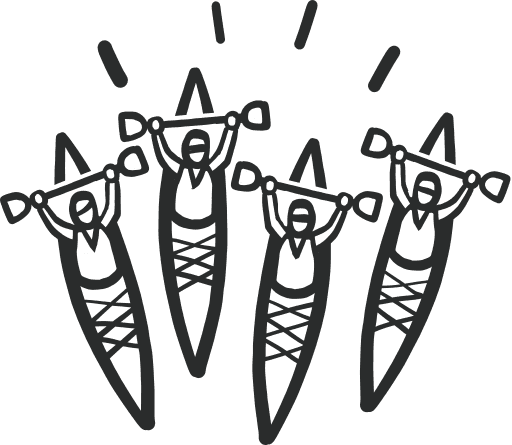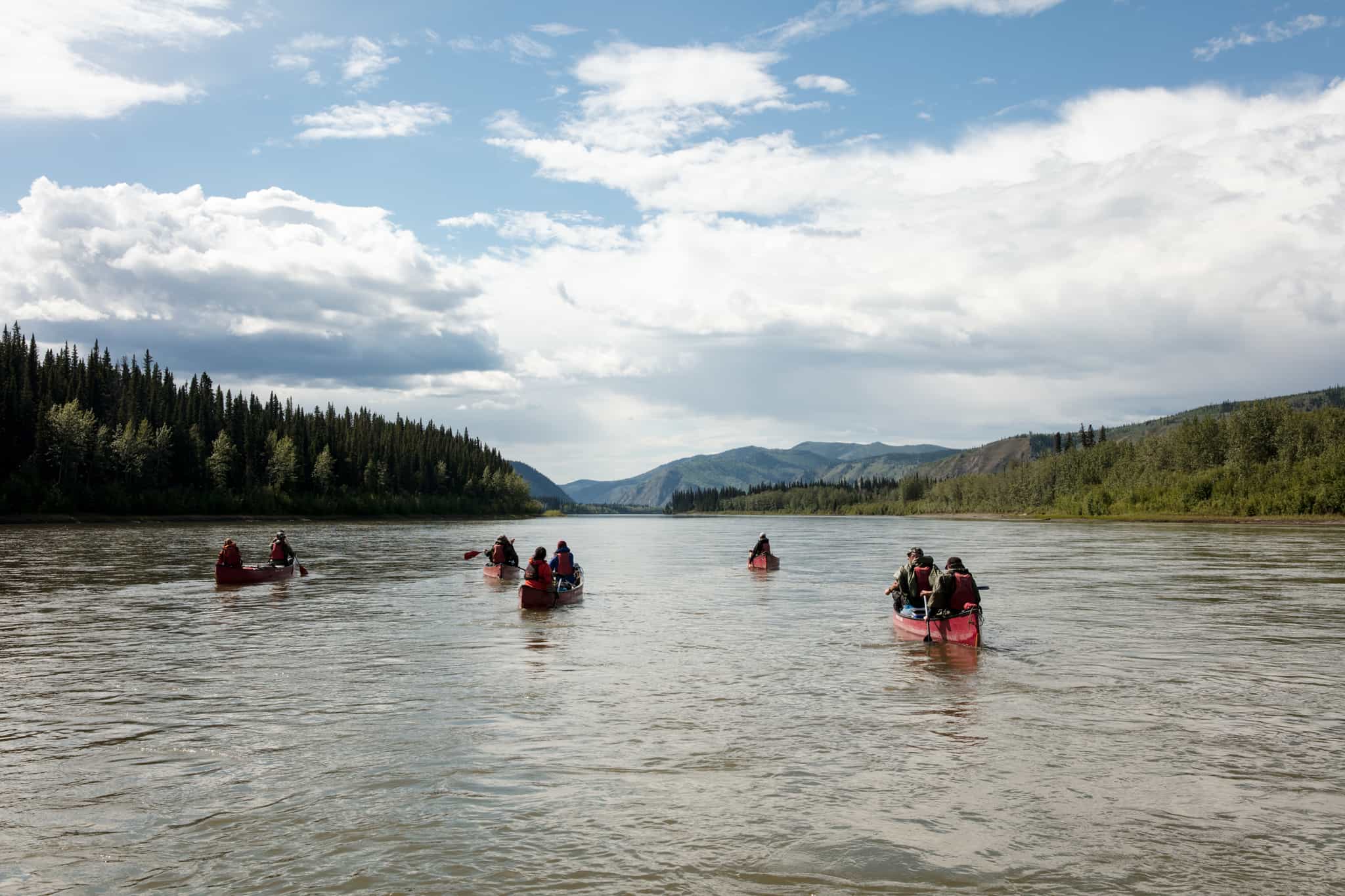
Canoe Expedition in the Yukon Wilderness
A Canadian epic. Paddle and wild camp your way through 350km of spectacular southern Yukon landscapes
What's Included?
Activities & Certified Guides
All itinerary activities with expert, local, English-speaking wilderness guidesHotel & Wild camping
2 nights in a hotel, 8 nights campingMeals
8 breakfasts, 9 lunches, and 8 dinnersTransfers
Airport transfers and everything in betweenEquipment
All your canoeing & camping equipmentSmall Like-minded Groups
Solo-friendly by design, join our small n’ sociable groups of up to 14 like-minded, active and outdoorsy people…
…
What's it like?






























Paddle calm and fast-flowing waters in the Teslin and Yukon Rivers through an ecosystem packed with history and wildlife
Lookout for bears, moose, caribou and eagles along the shore as you pass through the stunning scenery of the Yukon Valley in a traditional Canadian canoe
Camp out in the wild beneath the midnight sun on the banks of the river and spend evenings taking chilly dips, fishing and telling stories round the campfire
Key Information
Day 1
Welcome to Whitehorse
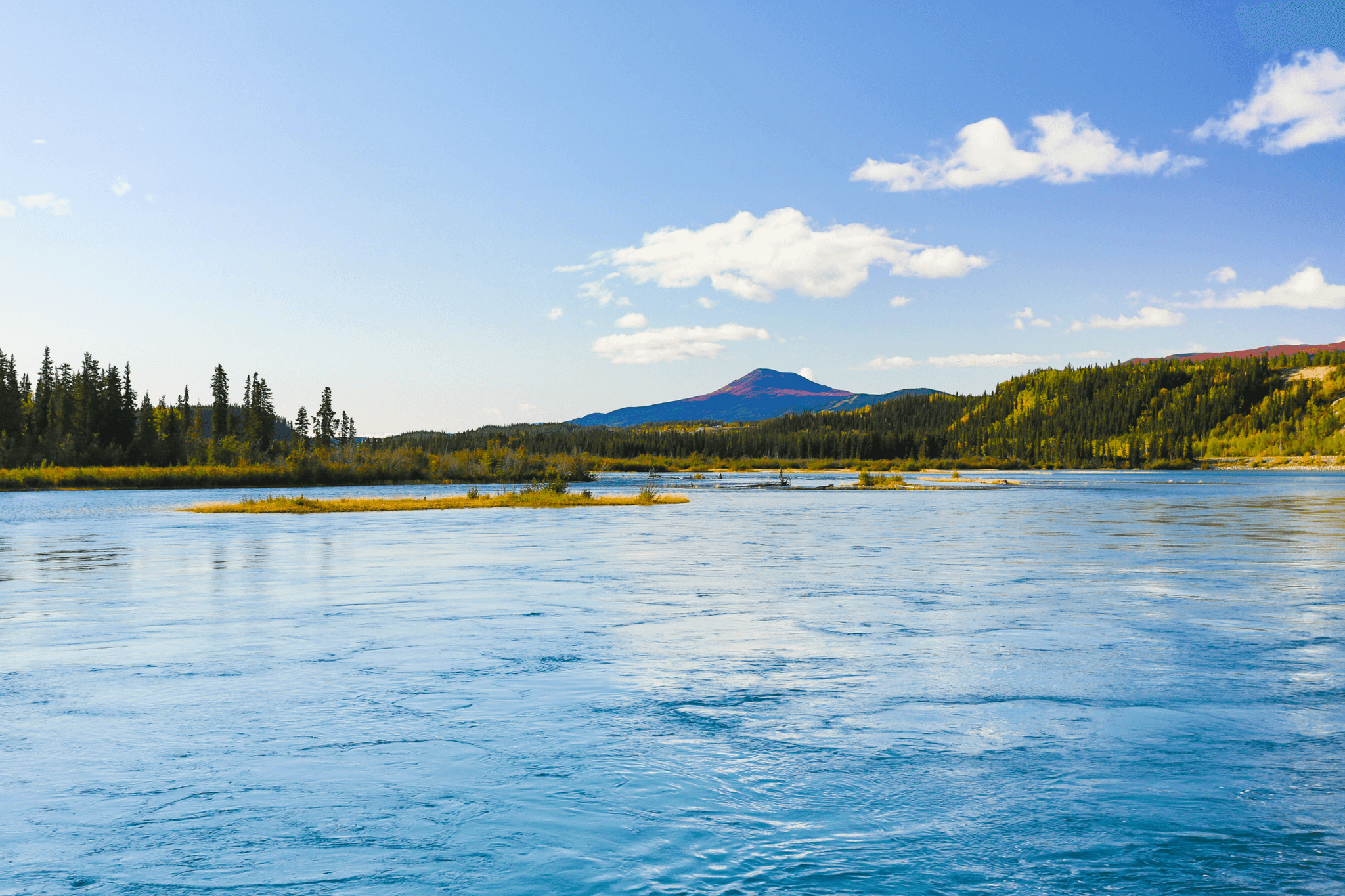
Welcome to Whitehorse! Your host will meet you at the airport and transfer you to your downtown hotel. In the afternoon there will be time to check out the city, have a gear check with your guides and a chance to pick up any last-minute supplies while in town.
Day 2
Take me to the river
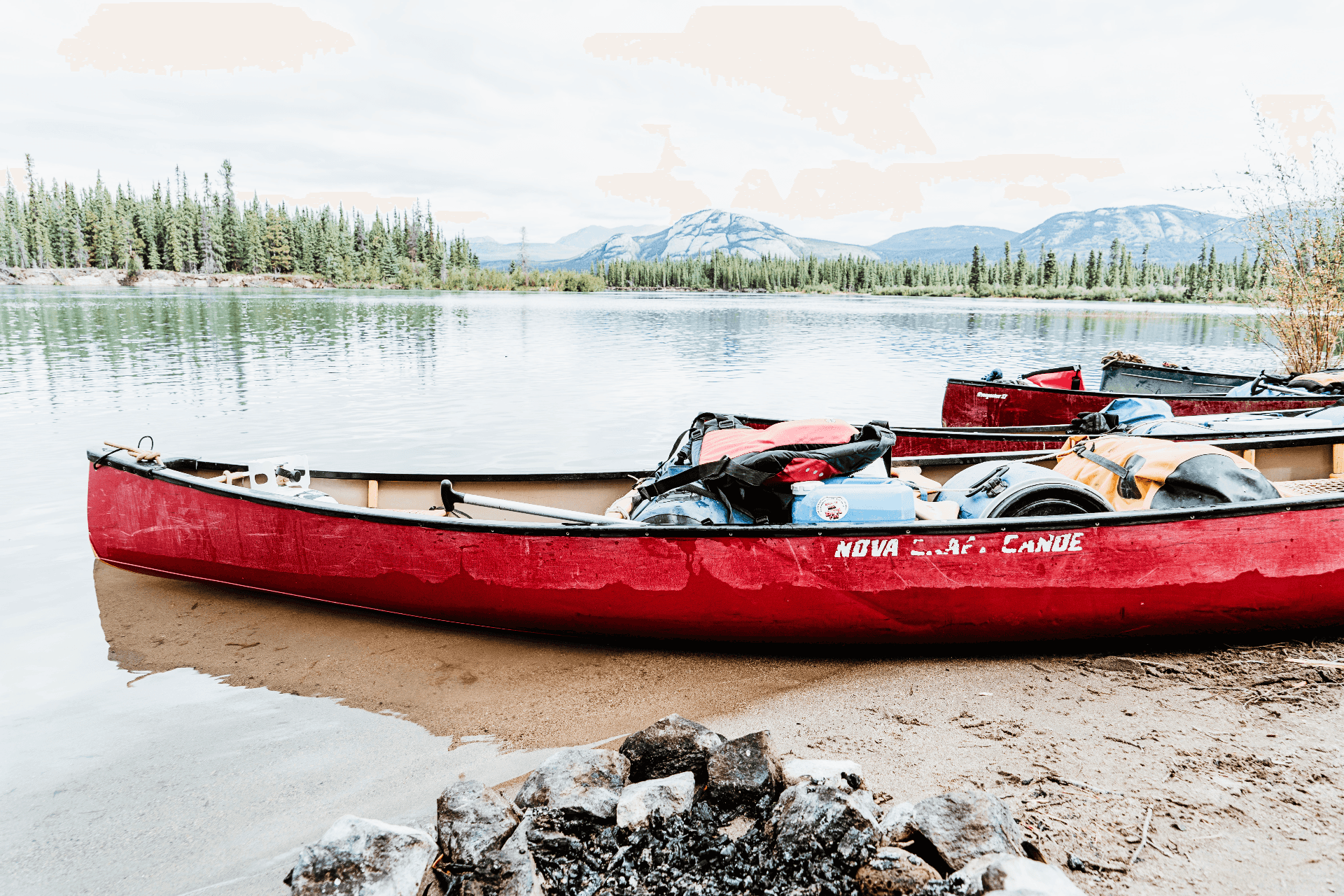
Canoeing
Driving
Jump in the van and head south along the Alaska Highway to reach the put-in spot at Johnson’s Crossing. Your guide will show you the ropes with some paddling techniques before it’s time to hit the river. Your first day is a short paddle to one of many potential camp spots along the river. The river is slow and gentle in this area, making it a safe and comfortable place to learn.
Day 3
Into the wild
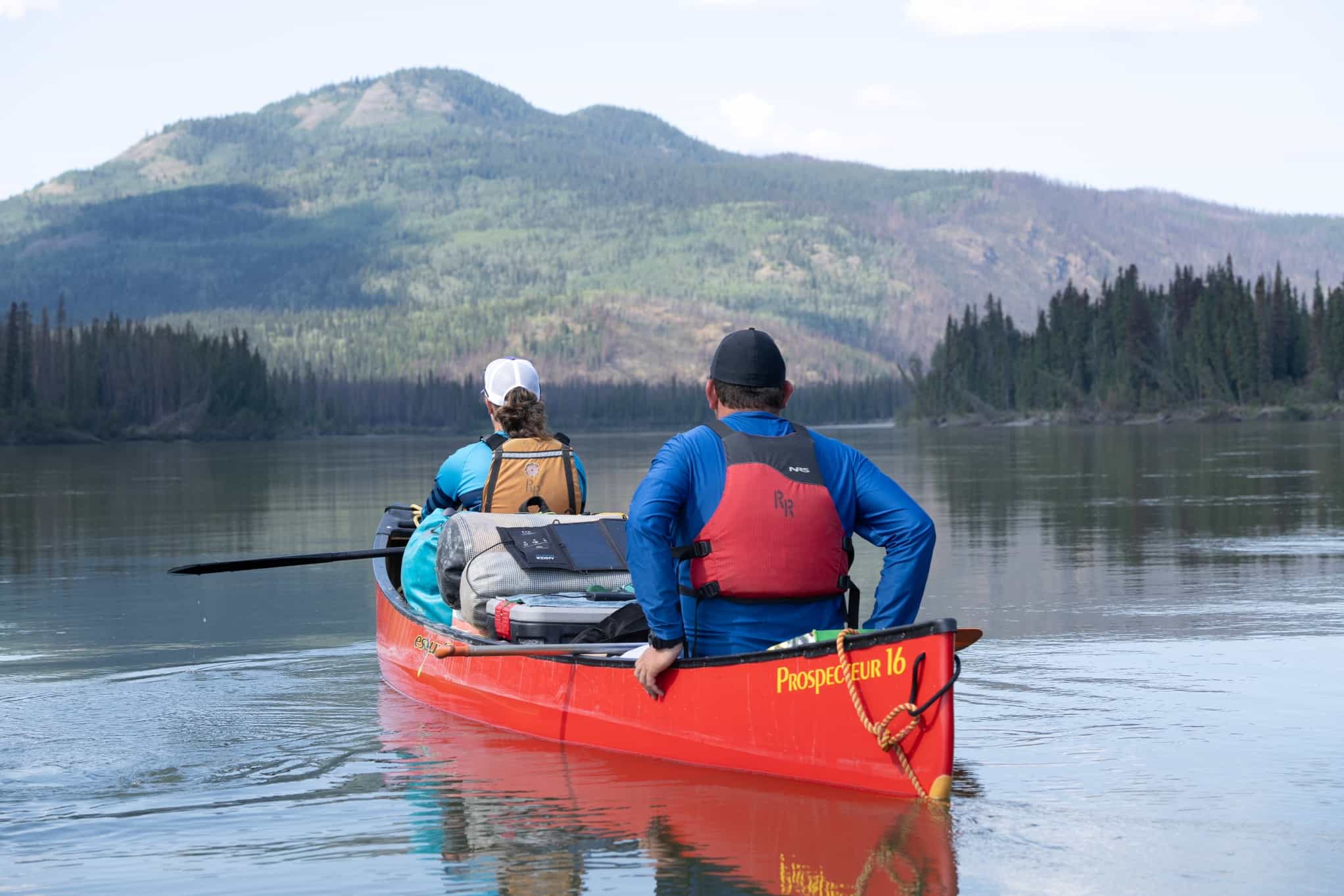
Canoeing
Get stuck into the expedition with your first full day on the river, winding through a mix of gentle currents and some faster sections and riffles – these are all less than Class 2 and your guide will show you how to navigate them safely. The Teslin River is part of the homeland of the Teslin Tlingit First Nation, for whom the river is still an important source of fish and moose.
Day 4
Eyes peeled for wildlife on the banks
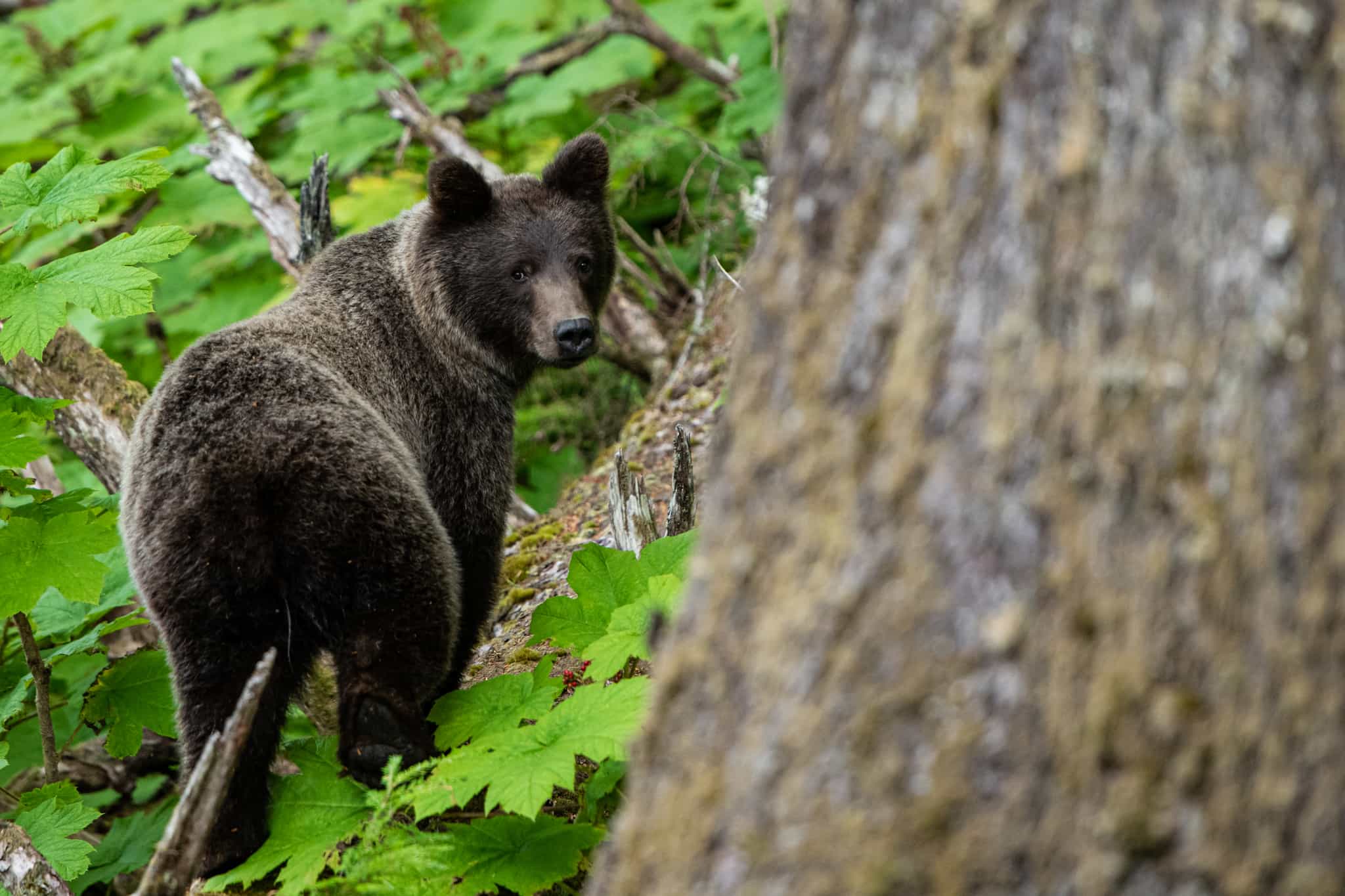
Canoeing
Tuck into breakfast on the banks of the river and pack down camp before putting in again. Getting deeper into the river ecosystem, keep scanning the banks as you paddle further down the Teslin for sightings of the many bears, moose, caribou and eagles that call this area of the Yukon home.
Day 5
Life on the river
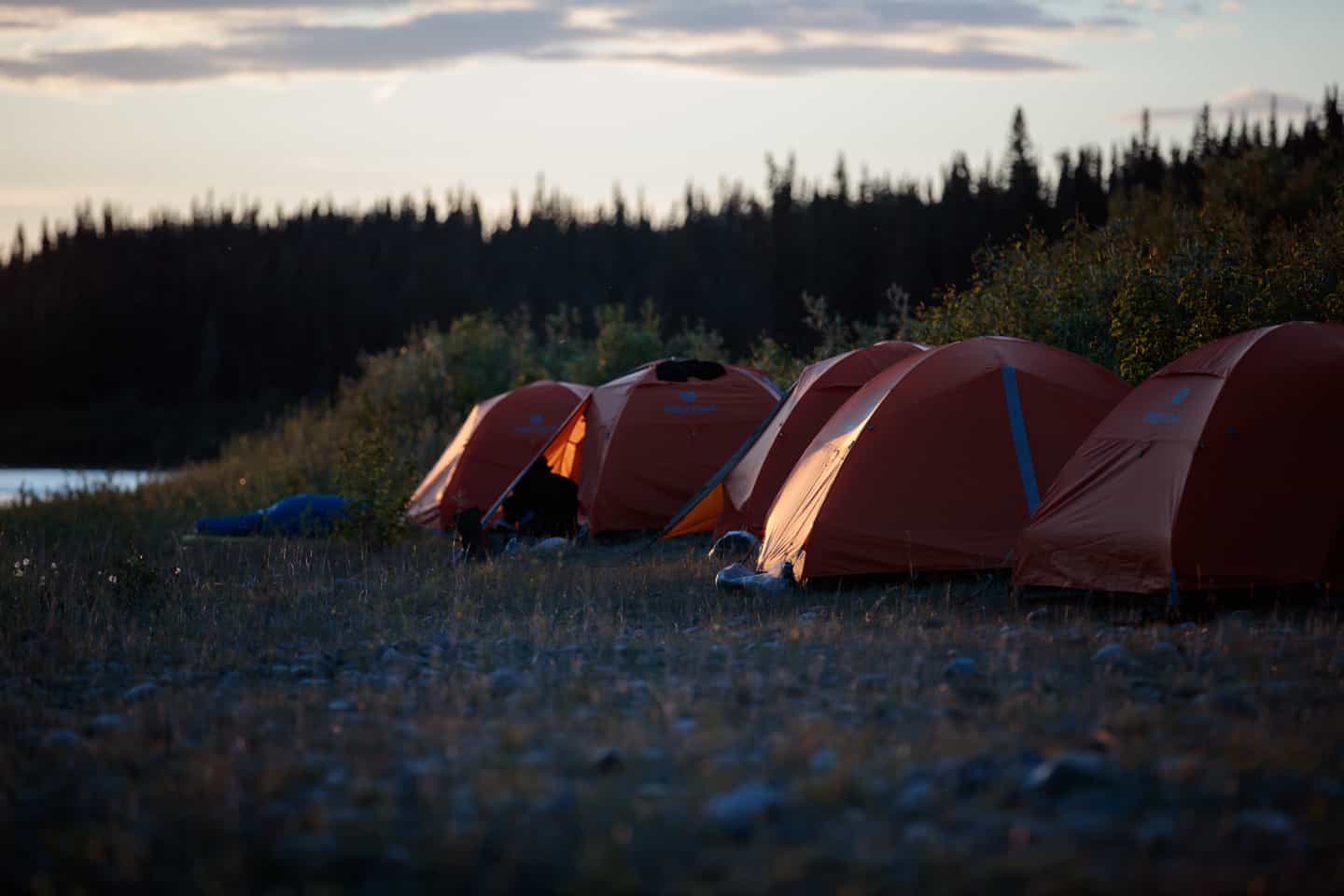
Canoeing
You'll be settled into the rhythm of life on the river by now, enjoying the rituals and roles that come with a wilderness camping expedition. Tuck into lunchtime picnics in amazing scenery while stretching the legs in between paddling stints. Each evening you'll enjoy a quintessential wilderness campfire dinner before bedding down in your tent to the gentle sounds of the river and the forest.
Day 6
Reaching the Yukon River
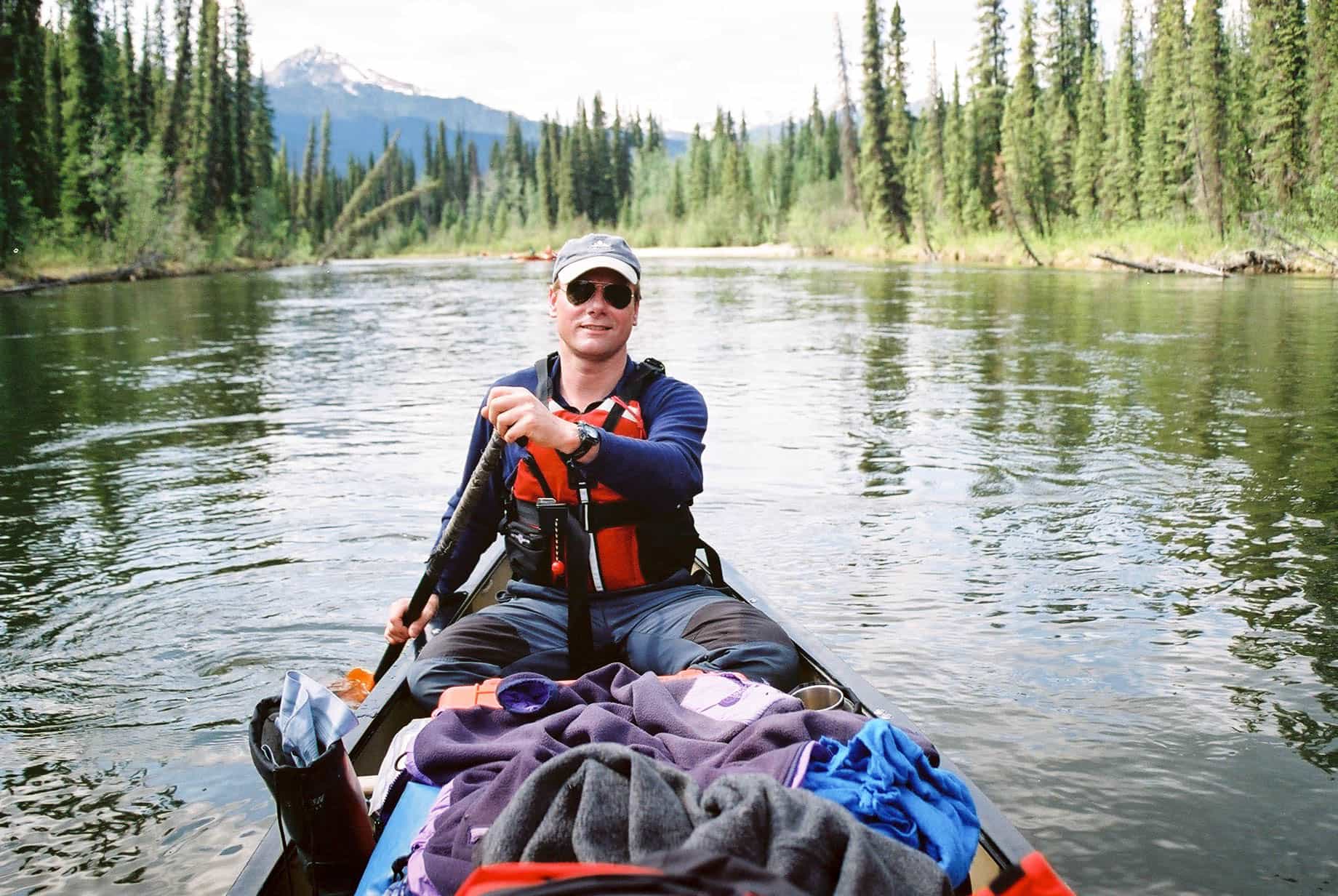
Canoeing
Today the Teslin flows into the Yukon River at the abandoned trading post at Hootalinqua. For the rest of the adventure you'll be paddling on the Yukon’s most famous river. History is tangible as you pass relics of paddle-wheelers, trapper’s cabins, mines, and trading posts, now overgrown and returned to a state the first newcomers to the territory might have recognised.
Day 7
Further along the Yukon
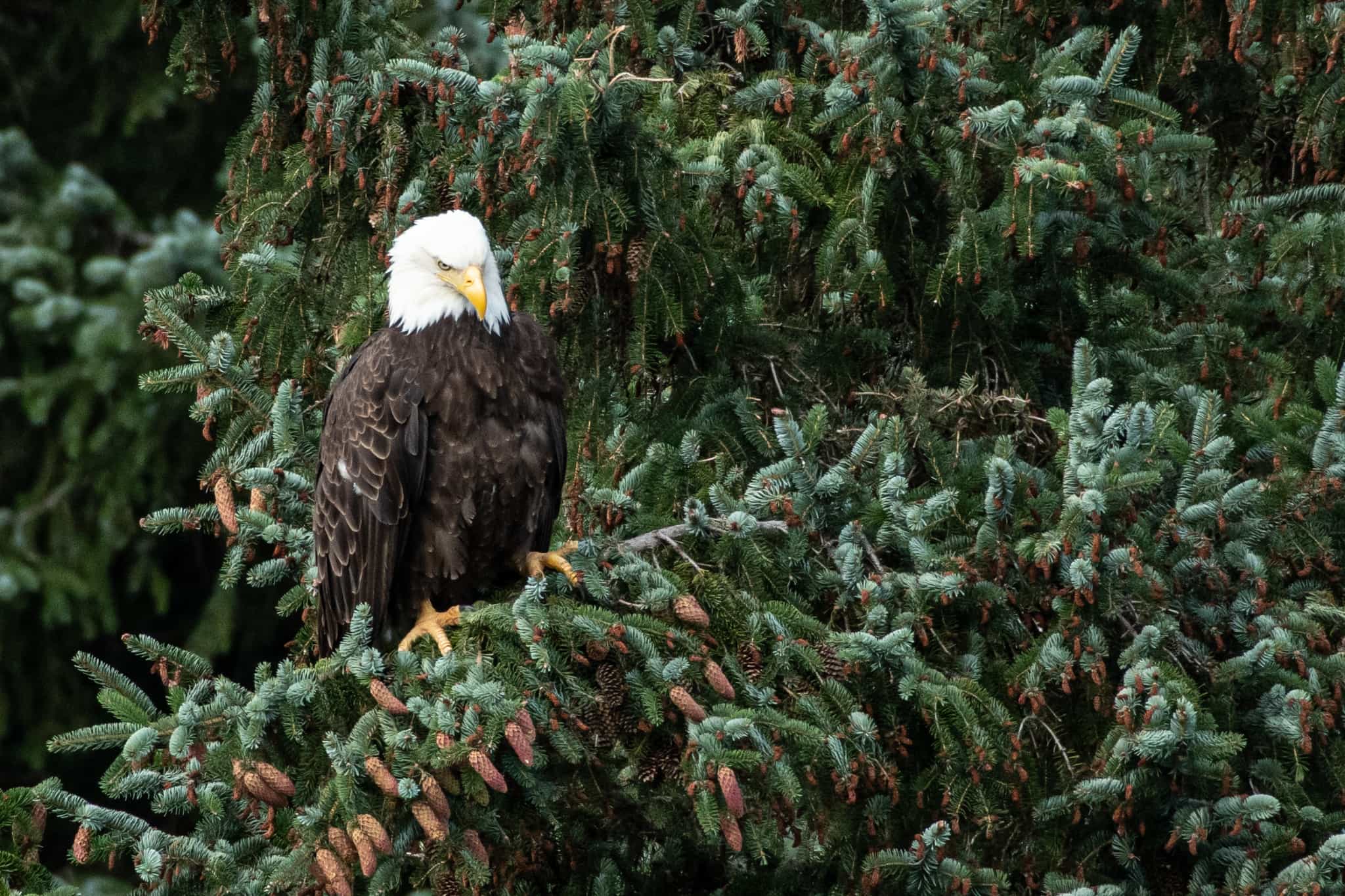
Canoeing
The Yukon River travels more than 3000km from its source lakes south of Whitehorse, all the way to the Bering Sea in north-west Alaska. Paddle long a remote section of the river today on the lookout for a good camp spot.
Day 8
One week in
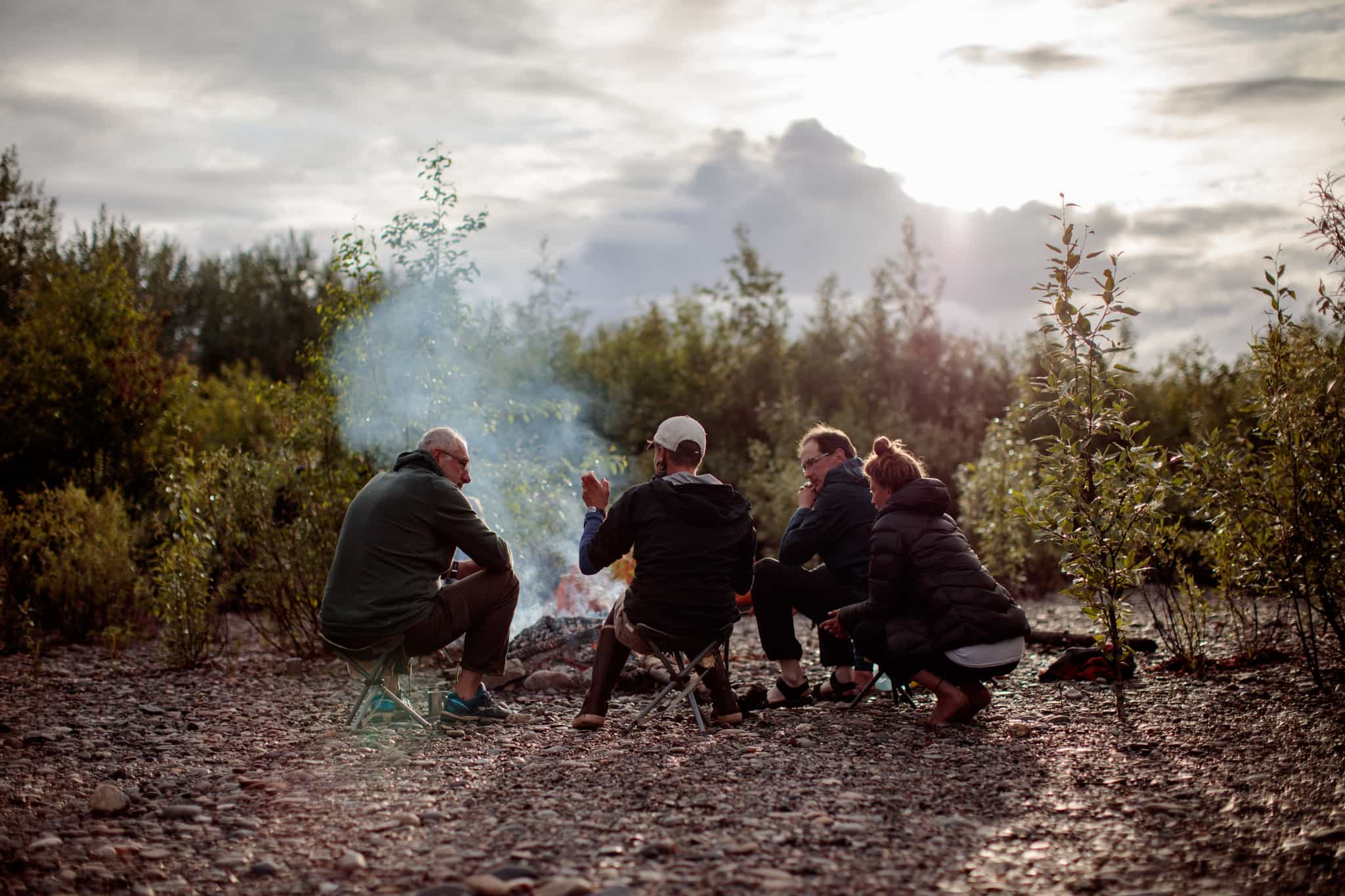
Canoeing
Continue along the remote section of the Yukon River, soaking up the feeling of being disconnected from the outside world for nearly a week already. Throughout the expedition your guides will be on the lookout for viewpoints or epic sunset spots, to give you a fresh perspective of the Yukon off the water. On trips later in the summer you can look for wild berries to pick to add to that night's dessert or tomorrow's breakfast.
Day 9
The final stretch
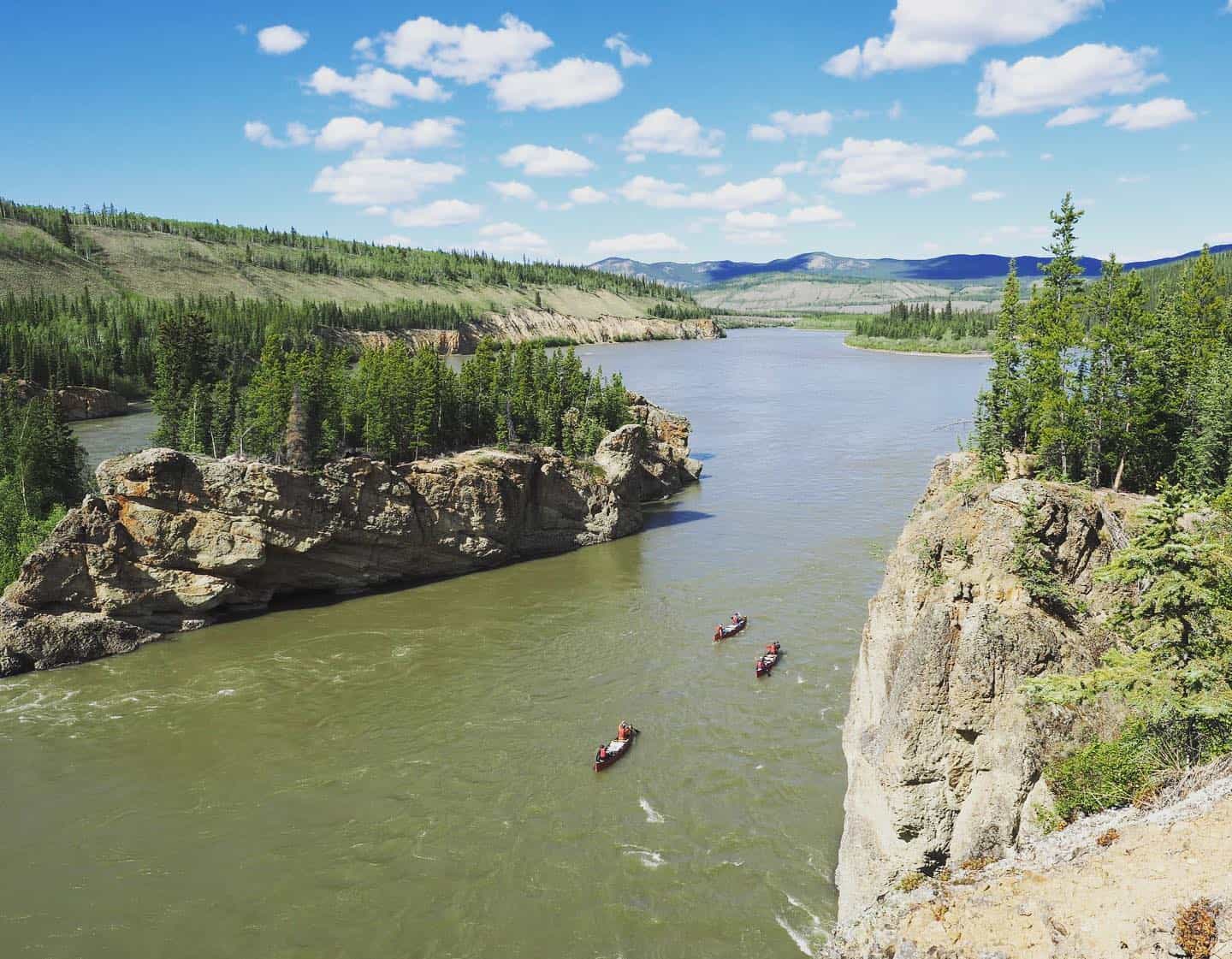
Canoeing
Your last full day and night on the river today as you soak up the wilderness you've been calling home for a week now. A lot of wildlife is commonly spotted on the banks around here, including black bears and moose, so keep your senses alert. Tonight will be a celebration with one final night out camping in the wild beneath skies that don't ever get dark this far north in summer.
Day 10
The paddling ends
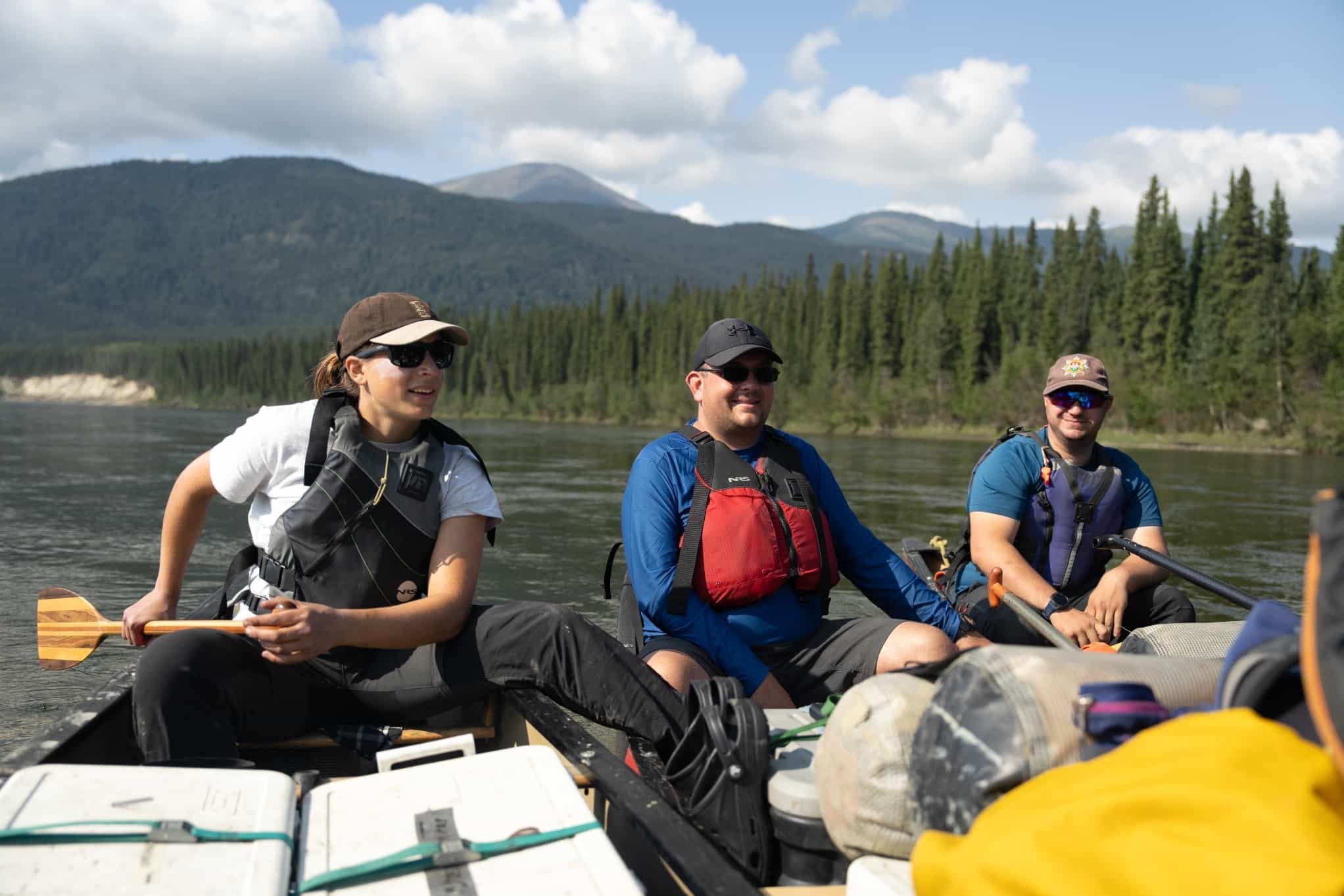
Canoeing
One last push today as you paddle the final part of your journey. After a week on the river, with very few signs of civilisation, you'll arrive at the small native village of Carmacks, where you'll unload the canoes and hop in the waiting van for the two-hour drive back to Whitehorse. Warm showers are the order of the day before a night on the town to celebrate the completion of an epic adventure.
Day 11
Farewell Yukon!
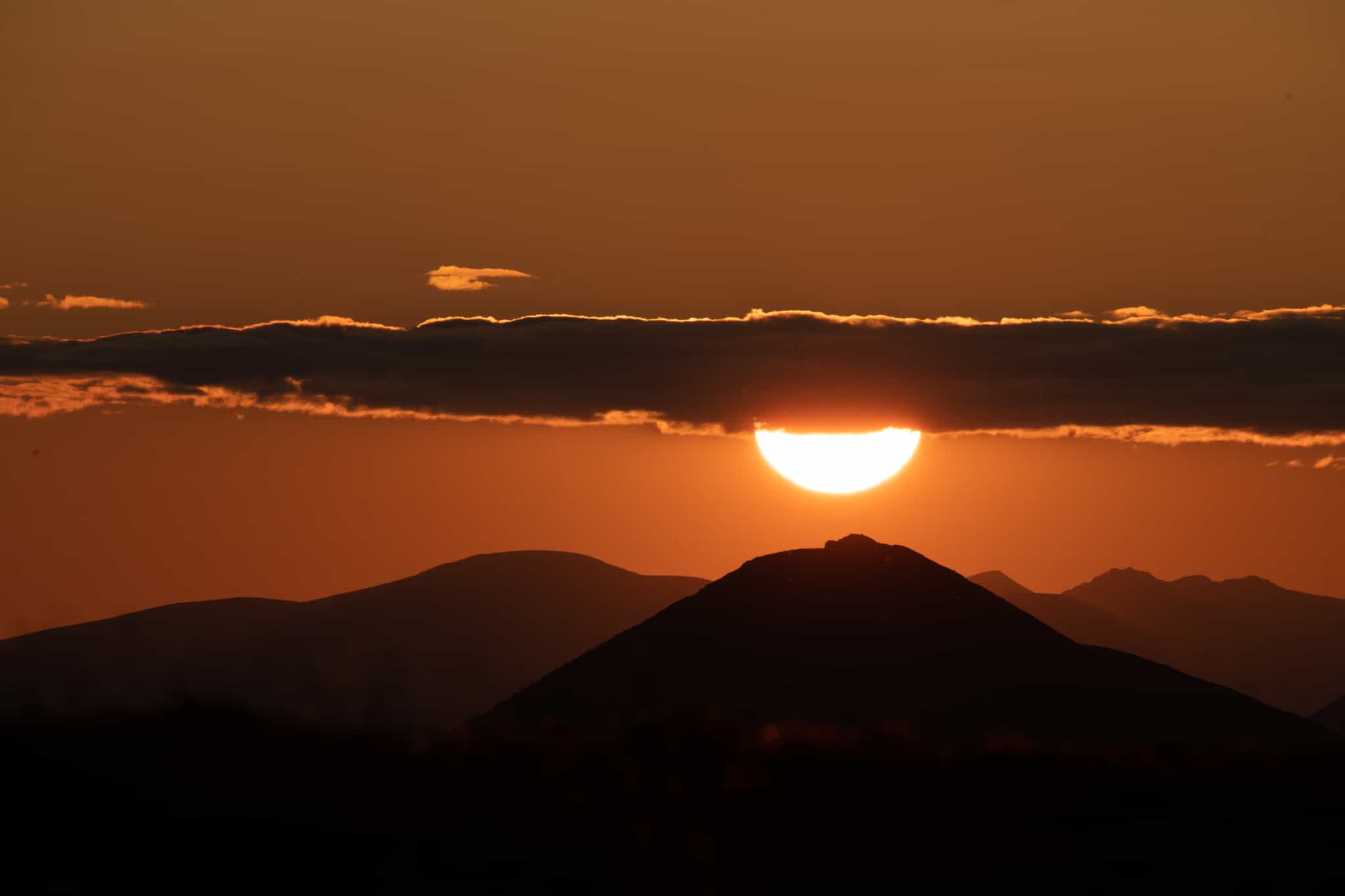
Your Canadian wilderness odyssey comes to an end today as your host drops you off at Whitehorse Airport in time for your onward flight.
The Area
Logistics
Starts
Whitehorse Airport, Canada
Anytime on Day 1
Ends
Whitehorse Airport, Canada
Anytime on Day 11
Transfers
You are free to arrive at Erik Nielsen Whitehorse International Airport in Whitehorse, Canada anytime on Day 1 - your host will meet you at the airport and transfer you to your downtown hotel. Note for late evening arrivals: as your guides need to get up early the next morning, please make use of the free airport shuttle to the hotel. On Day 11 your host will transfer you back to Whitehorse Airport in time for your return flight.
Arrival and departure transfers are only included in the main price if you arrive on Day 1 and depart on Day 11. If you would like a private transfer outside of these times, this can be arranged with your host for an extra cost - please see optional extras for the price.
Travel options
Whitehorse International Airport is easily accessible from all major airport hubs in Europe and North America, generally with a short transit in Vancouver en route.
Day 1
Breakfast
Lunch
Dinner
Day 2
Breakfast
Lunch
Dinner
Day 3 – Day 9
Breakfast
Lunch
Dinner
Day 10
Breakfast
Lunch
Dinner
Day 11
Breakfast
Lunch
Dinner
What is the food like?
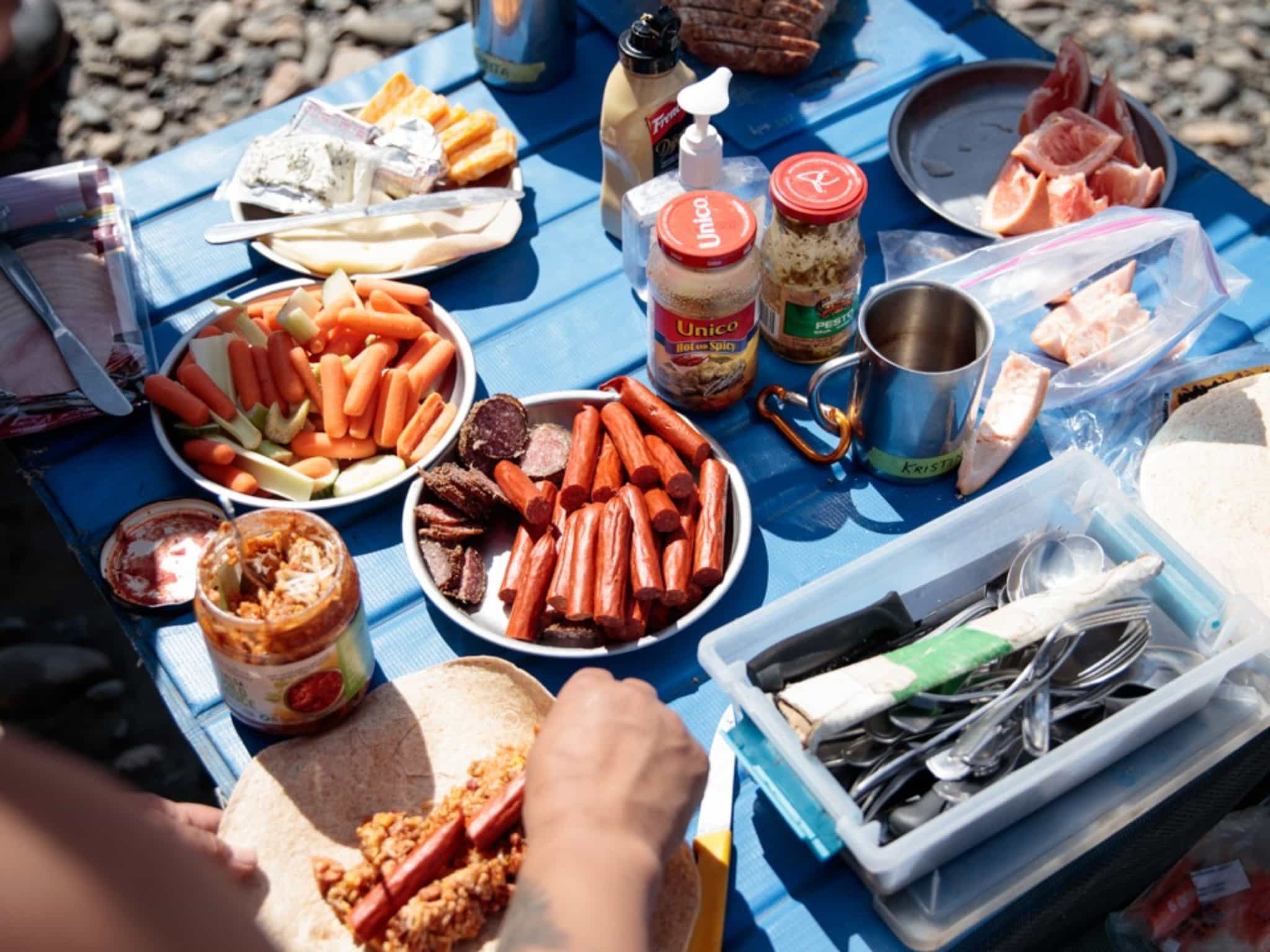
Despite the remote wilderness locations, you can expect to eat very well on this trip. Your host takes special care in preparing nutritious and delicious meals on their expeditions - just because you are in the wilderness, does not mean you have to eat freeze dried meals. Breakfasts will tend to be cooked oats with yoghurts, fruits, granola, breads and spreads. Lunches will be picnics, sandwiches with various meat and vegetable fillings, plus hummus dips, cheeses and fruit. Dinners vary each night, expect chillies and curries with rice and naan breads, big pasta dishes (good for fuel), plus ribs with roasted potatoes and cabbage salad.
This is a participatory camping expedition, so you'll be mucking in with food prep, cooking and clearing up.
Vegetarians, vegans and other dietary requirements and allergies can be catered for - please just request this on your passenger info form.
What is the accommodation like?
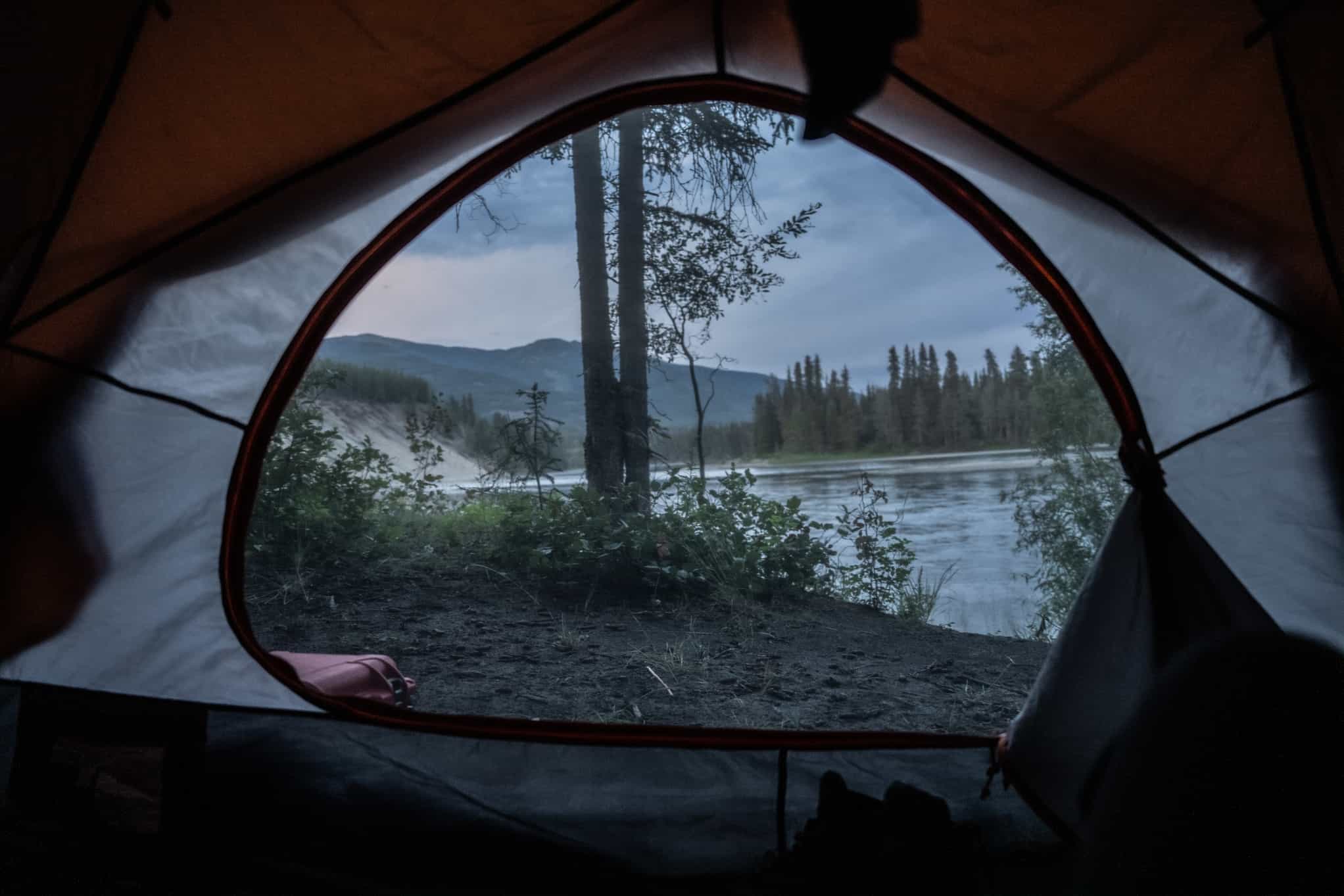
Wilderness camping
You'll spend 8 nights wild camping out in the wilderness on the banks of the river. The group will choose the best spots towards the end of each day with advice from your guide. This is a participatory camping expedition, so it's a group effort to put up and take down camp each day. You'll stay in twin-share expedition dome tents (Marmot or MSR). You'll need to bring your own sleeping mat and sleeping bag, ideally lightweight pack down items such as a Thermarest. Your nights camping in the Yukon are some of the best memories you'll take away from this adventure.
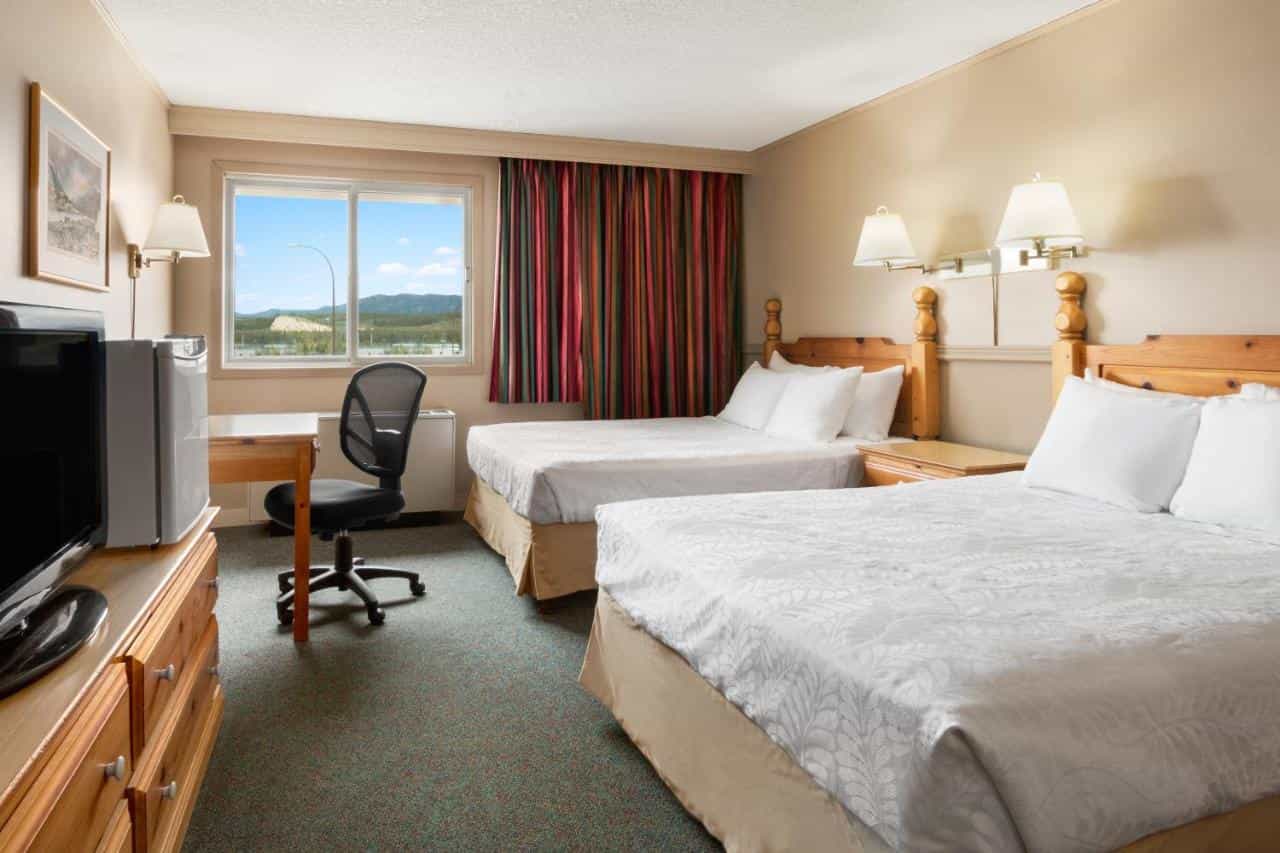
Whitehorse
Either side of the expedition you'll spend a night at the Quality Inn & Suites Hotel in Whitehorse with all the usual amenities. It'll feel like luxury after your time camping in the wilderness. You'll stay in twin-share rooms with ensuite bathroom.
Upgrades
For solo travellers looking for their own space, an optional private room and tent can be booked for an extra charge, see Optional Extras for the price. Please request this at the time of booking (this is subject to availability).
This trip has been rated as Moderate
You don't need any prior canoeing experience, the expedition is easy-paced and your guides will provide full instruction on how to get through the trip safely and stay as dry as possible. You don't need incredible fitness, but you will be paddling steadily for 5-6 hours a day, which does require endurance. The main challenge is being out in the wild for a full week, with no creature comforts, little to no phone signal and 8 nights of consecutive camping. This is all part of the adventure - the Yukon will bring a sense of solitude and peacefulness that you can seldom experience anywhere else.
Temperature-wise, Yukon summers are pleasant and similar to many parts of northern Europe. Average temperatures from June to August will see highs of 16°c / 64°f and lows of 8°c / 46°f. The river environment you are paddling through is cold - you're close to the Arctic Circle up here - so the water will make things feel chilly at times. Evenings at camp will be a little colder, but not terrifyingly so, and you'll be well equipped for warm nights out camping. As with many remote wilderness areas, the weather can come in and change things very quickly. Heavy rainfall can happen in this area so you need to be prepared for the possibility of wet conditions on an expedition of this type. It's essential that you bring genuine, 100% waterproof jackets and trousers for this eventuality. Your host recommends that you re-treat the outside of your waterproofs with a new waterproof coating (DWR) before the expedition.


It's the f-ing Yukon!
If you are reviewing this trip with any ounce of seriousness, I would fully recommend you book. It will not disappoint! It's the f-ing Yukon!
Full disclosure, I had previously only canoed once before on a Primary school trip so my main motivation for booking was that of the sheer remoteness and frontier-esque aspects. That said, I loved every moment on the water - even our brief paddle through a storm. In the 9 nights we encountered truly wild terrain, fast and slow waters (though nothing too technical), deafening headwinds, moose families, bald eagles in numbers like pigeons, beavers, we feasted on fresh pike and I even fought a squirrel (it ended a draw). A true adventure, lead by two great guides Marguerite and Jan.
My tips on reflection would be: • Don’t underestimate the physicality – though not overly demanding, there are multiple days of 35+ miles (60+km) so stamina is a must • Teamwork makes the dreamwork – every part of this trip is better as a team from the setting up and dismantling of the camp, to the personal bond you will form with your paddle partner (a shout out to mine, Dave, as he did most of the hard work!) • Your feet will get wet – it’s inevitable. Priorities quick dry/drain footwear (I wore sandals) for day use and keep warm layers for the camp. This applies to all clothing.




Got just what I was
Got just what I was hoping for on this trip. Our guides Marguerite and Jan did an excellent job throughout the trip. They were knowledgeable and personable throughout the trip. Also did a great job with cooking for our group. The scenery is good but not spectacular in my opinion but as that wasn’t what I was looking for or expecting it wasn’t a big deal. What I was looking for and got was true isolation from society. No phone service throughout the trip no roads or traffic noise, no motorboats, not even planes flying overhead. Just the sounds and peacefulness of nature. Not having the temptation of phones and technology allows you to relax and forget the world for a week was so enjoyable and something everyone should experience from time to time. The trip does take a lot of energy and work to get through but is doable for anyone in decent shape. The paddling, setting and taking down camp each day certainly will keep you busy but some days are planned to be shorter and give you a chance to slow down and rest a bit.
Great trip, more challenging than
Great trip, more challenging than expected







Yukon Gold
I have just returned from what was an epic trip through the Yukon Wilderness, our guides Marguerite and Jeremy were excellent throughout the trip sharing stories of the gold rush and the first nation inhabitants, expertly guiding us through the Teslin and Yukon rivers showing us techniques on canoeing, knots and camping tips. Their energy and enthusiasm for the wild and leaving no trace and for making sure the trip went as planned was fantastic.
We ate like kings every night from Sockeye salmon, burgers over an open fire, ribs and pasta with camp fire smores for desert made the whole trip incredible. We had a varied group with different skill sets but everyone pulled together and contributed to setting up camp, cooking, starting the fire, cleaning dishes, filtering water and packing up each morning, it was a real team effort and became second nature after a few days. Catching a few fish along the way and having them for lunch the next day was an excellent way to really experience the wild and how to survive.
The area is breathtaking and each day as we set out we made comments like, 'you'd never get bored with this view' or 'what an incredible day this is', we were really lucky with the weather being 25 degrees and sunny most days with only a 20 minute shower the whole week, which made camp so much more enjoyable as we sat around the fire and got to know each other.
The trip is tough and some of the longer days were tiring but it was so worth the effort to enjoy such a magical journey through the Yukon, we saw Bald Eagles, Moose, Hawks and signs of beavers and the birdsong each morning was something that was truly special. The organization and communication from day one was great, and i felt in very safe and experienced hands throughout the trip. Thanks you for such an epic journey and something I will never forget




A communion with the natural world!
This was a fantastic trip into genuine wilderness. The awe-inspiring remoteness cannot be underestimated and nor can the benefit of being totally disconnected. The lead guide was amazingly knowledgeable, enthusiastic and the whole group had a great energy about it. I travelled alone to join an expedition and was made to feel very welcome - everybody helped out and supported each other helping to make this feel like a sort of spiritual communion with the natural world.
Amazing trip canoeing in the Yukon!!!
What a stunning 9 days canoeing in the Yukon Territory in Canada. This place has totally flawed me with its remote nature and shear beauty. The river has taken us on an incredible journey and has been very kind. Wonderful weather although the heat is causing issues with forest fires which is a concern for the ecology in the area. This trip is into the heart of the Yukon wilderness. No phone signal meant we had a true digital detox for 9 days which has been very therapeutic and made me ask questions about my own habits after returning home. This trip has been magical. Our guide Marguerite has been nothing short of awesome! Her passion for the outdoors combined with her incredible skills in living in the wilderness cannot be faulted. She looked after the group so well and coached us all on the canoeing skills we would need for the week ahead as well as the camp craft required to survive. The focus on the ecology and not leaving a trace was excellent and taught me lot. This trip requires resilience and is not easy by any stretch of the imagination. The longer days on the river were very tiring but also very rewarding. We had good weather the whole trip but I could imagine how this would be made more challenging in windy and raining conditions. This has been the trip of a lifetime! I will miss the Yukon and what it has done for my own wellbeing and that of everyone in the group. It was very much a group effort and by working as a team we made the work element much less of a task and was a key factor. I have no criticism of this trip. The food was fantastic and all safety concerns were handled very well indeed. I will look forward to booking my next trip soon!! This one will be very hard to beat!! Thank you!!




Amazing experience - but very challenging
I mainly booked this tour for two reasons:
- to try something new (canoeing)
- to experience some really remote wilderness and nature that is (mostly) untouched by nature
I can only say, I got exactly what I wanted and I'm really glad I did this!
On top of that I was in a group of wonderful people. We all supported each other at all times and everybody was willing to put in the work necessary to make this trip happen. The guides gave us plenty opportunity to improve our canoeing skills and constantly supplied us with great food.
However, the work should not be underestimated: many hours of paddling plus several hours of other chores each day: pitching and taking down of tents, lugging heavy boxes to and from the canoes, digging the latrine trench, washing the dishes, etc. It was a lot and you did sometimes wish for a little more slack time to just relax and enjoy, although we certainly did that as well.
The weather conditions only added to the challenges: we had a little bit of everything: rain, hail, lightning, sunshine, evenings where you could go swim in the (icecold) river and nights that made you wish for a warmer sleeping bag. Anything's possible in the Yukon terrritories and while that wasn't always easy to handle, I think it was part of the adventure!



Last true wilderness
The Yukon was everything I expected and more. Our guides Rachel and Eric were brilliant taking such good care of us. They helped us to navigate the paddling and even joining in the evening fun for a good few games of hacky sack after a day on the river. I would say if you can get a little taster session in a canoe first if you’ve never done it before maybe helpful. I wish I had but it’s not essential. Having a good level of fitness is a must as well as being a team player all unloading, loading and packing away gear is a group effort. I was with such a great group of people it made this very easy. I would definitely recommend this trip. Can’t wait for my next MBA trip.
Amazing trip but poor guiding
The trip is really tough so definitely don’t underestimate how physically demanding it is. But a massive achievement, beautiful scenery and met some amazing people! Our guide was quite snappy and got us lost a few times, there was also a communication mix up within the company around pick ups etc. overall we had a good trip.



Life changing
Without shadow of a doubt a life changing trip, The Yukon offers up an extraordinary perspective with its views and stories. Must see & feel!
Not a-lot of hiking involved - we did a 1 20min walk. So wouldn't bother with hiking footwear!
The guides Rachael and Eric were fantastic great fun & amazing chefs 10/10
Breathtaking. Perserverance. Rewarding.
Rachel and Eric led a superb trip that dropped us off at Johnson’s crossing in the Teslin River and took us eight days through the wilderness to Carmacks. It is definitely not a trip for the faint hearted, or those not up for a physical challenge, this trip relies on your own perseverance to keep going (even if it rains on you all day!!) and sense of teamwork and helping out. Prepare to get stuck in and put others before yourself, when this matters most is when you arrive at camp at the end of a long day and help others unload boats, gear and set up tents and dig latrines!
It is an incredible trip, and all those outdoor enthusiasts it is a rare opportunity run by the super company ruby range.
We had great group dynamics and a real sense of fun on the trip, playing paddling games, learning skills, playing many games of yahtzee in the evenings and ensuring we were roped up with snores on sunny evenings. It rained 2/8 days for us. Rain isn’t apparently all that common but it absolutely tipped it down for us, so be prepared for everything. What I loved most about the trip was the total absence of technology and silence of the place. We saw moose, beaver and eagles!
The food is amazing, salmon/ bison/elk/ quinoa/ fresh veg/ tortillas/ rye bread / beans and eggs . The guides are so impressive with what they manage to cook up.
Here are my packing takeaways-
- You don’t need as much as you think
- NRS boundary boots are the BEST shoes ever, combined with a pair of arctic dry waterproof socks. They must be high as you waive through water. Also bring crocs. You need these for camp and hot days!!! Many others wore wellies and were okay with those. You don’t need hiking shoes.
- NRS touring jacket was also amazing, I didn’t get my clothes wet at all with this due to the neoprene wrists- this was amazing. Expensive but great. Check out escape watersports if you are from the UK.
- You can wash your clothes in the river and I could therefore have packed half as much- I could easily have taken maybe 2 tops instead of 4/5!
- Thermals might not be needed- I didn’t wear mine.
- One jumper- not two!
- 1 pair of dry socks, not loads!
- Bring a mosquito head net!!!!
- Bring a 20l dry bag as a ‘day bag’ that was my size and it was perfect to put my waterproofs in for when we needed to change in the boats!
- Canoeing experience not needed they teach you
- You don’t really need additional snacks- they have LOADS of nutri grain bars etc…
- Vegetarian/gluten free was catered for on our trip!
- Everything you own should be quick dry- you’ll thank me for this!
- You can shampoo and wash in the river, it’s cold but you get used to it! Crocs important due to rocky shore in some places
- I recommend a warm sleeping bag and liner. I had one down to -16 and a cotton liner this was perfect first cold nights, in the hot nights I didn’t even bother with a sleeping bag but better safe than sorry!
- Roll matts- invest. I got a 5cm self inflating one from vango, which was amazing and saved me so much time.
- Bring a game to play for the evenings!
- Bring a buff- doubles up as an eye mask for that midnight sun!
- Bring your tip in cash. Our guide had to head off fast at the end.
- Be aware of wild roses out there- they have spiky stalks and some on our group reacted to them! So I recommend some antihistamines.
- Light zip off trousers I think are the best, I got ones from decathlon. It can be BOILING hot, or very wet.
- Moisturiser for hands- do this daily.
- Personally I wouldn’t bother with gloves specifically for paddling I think they cause you more blisters from experience especially when wet. Some light gloves for the mornings is nice though as it is chilly.
- Jacket wise I took a light puffa layer. Worked a treat.
- I didn’t need my thermos but could have brought more black tea.
Amazing adventure
Truly excellent trip with amazing experiences everyday. The guides were really supportive, very knowledgeable and they really could not do enough for us throughout. The food was excellent and we had a some great fun with a lovely group of like minded people. I will definitely book again with Much Better Adventure. Very pleased 10/10 in all areas.


to Have and to Hold (the paddle)
When we booked this trip as part of our honeymoon adventure, we didn't really know what we were letting ourselves in for.
Not only was this one of the most brilliantly challenging things we have done together, but the people we ended up spending 10 days with are some of the best people I've met. Never have I laughed so much, minutes after silently cursing myself for thinking a canoeing trip on the freezing cold Yukon river would be romantic.
Every day of this trip brought something new. New snacks from our guide Rachel's endless bag of goodies, new stories from the group, and new wildlife to see and admire. One of the best things about this trip was never knowing what we would see around the next riverbend, and the proximity you can get to eagles, moose, beavers, and more.
The website description doesn't do justice to how challenging but completely immersive this trip is. When they say "Yukon Wilderness" they mean it - you won't see civilisation or anything manmade for over a week, and only stumble across a few remnants of the Yukon Goldrush.
All in all, this trip was one of our best adventures to date. We could share all the photos in the world but still be unable to describe quite how it feels to canoe down a river that is so vast, peaceful, and completely beautiful. If you're hesitating about booking this trip, take our advice and just do it. You won't regret it!






An Awesome Adventure!
This is a true adventure into the wilderness of the Canadian Yukon. You will canoe starting from the Teslin and into the Yukon river, through the forests and mountains of Canada's far north. You will stop each night on a campsite beside the river, well away from human civilisation and into the habitat of bears, beavers, moose, elk and eagles. Keep a keen eye on the riverbank and the sky to spot all of the unique wildlife whilst you are out on the water. Distance covered is about 400km on the river in total across the trip. The Yukon was the place of the last great goldrush of the 19th century; the Klondike Goldrush. There is still evidence of that Goldrush on the river like steamboat wrecks, gold dredging sites and telegraph stations.
Group dynamics are great! You can expect to spend time with others that love the outdoors and are ready for a fun challenge. I travelled solo
Don't expect to eat noodles and freeze dried food, there is plenty of space in the canoes for delicious fresh food! Expect to eat meat, cheese, bread, fruits and vegetables all prepared by your host. Delightful meals included pancakes on a stony beach and bison/caribou sausages cooked on a campfire.
The sights are absolutely spectacular and with some luck you will spot some awesome wildlife in their natural habitat.
Tips for travellers:
- Waterproof gear is essential- Be prepared for rain and to get wet, splashed on and to get your feet soaked. A waterproof jacket with a hood and waterproof trousers are essential. Tall wellington boots are a must as your feet will sink into the water and mud, get boots that are 8-10 inches high, industrial wellington boots are suitable.
- Canoeing experience isn't essential, but an understanding of water sports and water safety is important.
- Experience in camping and outdoors life is essential- Know how to keep yourself warm, dry and clean at camp.
- Bring a team spirit and a team attitude; everyone has to contribute to do the essential tasks of loading & unloading, setting up, packing up and washing up, your guide cannot do all of that for you!
- Be reasonably fit, and be prepared for an average of 5-6 hours of canoeing each day.
- Expect both cold and hot conditions- So bring warm jackets, thermals, gloves, beanies as well as t-shirts, shorts and sunscreen for those hot & sunny days.
- Bring a positive attitude and a willingness to experience the true wilderness!
It was well worth travelling 17,000km from Australia to the Canadian Yukon for this!




Wild Water Adventure
Don't be fooled by the serene photos - this 10-day canoe expedition along the Teslin and Yukon rivers is a true wilderness adventure that will test your limits. From loading and unloading gear to negotiating fast-flowing eddies, the days are long, and the work is real. You'll encounter both bright sun and biting cold – if you decide on an early paddle. (We struck out at 4.30 am one morning, and there was ice on the kit bags!) But overcoming the challenges as a tight-knit team is half the reward.
The payoff for the effort is immense. You'll paddle through some of the most stunningly wild and untouched landscapes in North America. Gliding along these iconic rivers, you feel blissfully disconnected from the modern world. Otters, owls, eagles, beavers and moose replace human company. After just a day, you feel immersed in the rhythm of the water and the land.
The wild campsites are spectacular, and the food is delicious, especially given the remote setting. We even had a blueberry pancake brunch on a pebble island.
But the true magic of this trip is in the camaraderie that emerges from working together. You truly are in the middle of nowhere and, therefore, very reliant on one another. Luckily for me, Dylan, Carly, Helen, Chesc, Harry and Lachy were amazing paddle mates.
Practically, this is a tougher-than-sold trip; you’re on the water for 5-6 hours a day, and you need to be fit. Make sure you have robust gloves, waterproof boots, quality hand cream, and clothes for all conditions. We got soaked through on days 1 and 2, but after that, it was blissfully sunny. You really don’t need hiking boots. Pack as light as you can; it makes the canoes faster and leaves less to lug on and offshore.
Finally, huge credit goes to our exceptional guide, Rachel, who deftly led us through this challenging journey with skill, hard work and constant positivity. Her knowledge of the land, passion for the wilderness, and joyous personality made the experience truly special.
This is a serious expedition, not to be taken lightly, but if you're willing to work for it, the rewards are immense.
A super trip
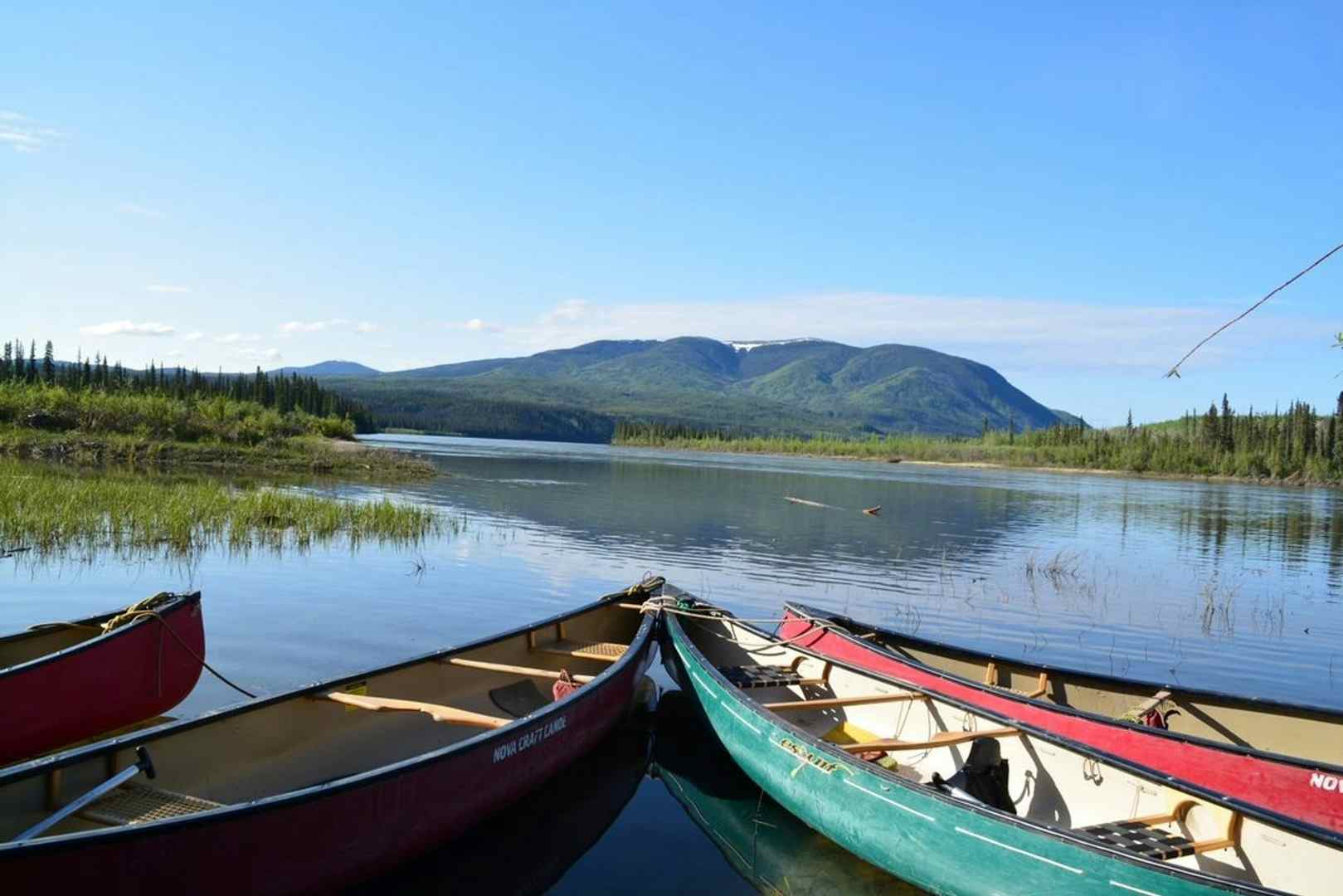
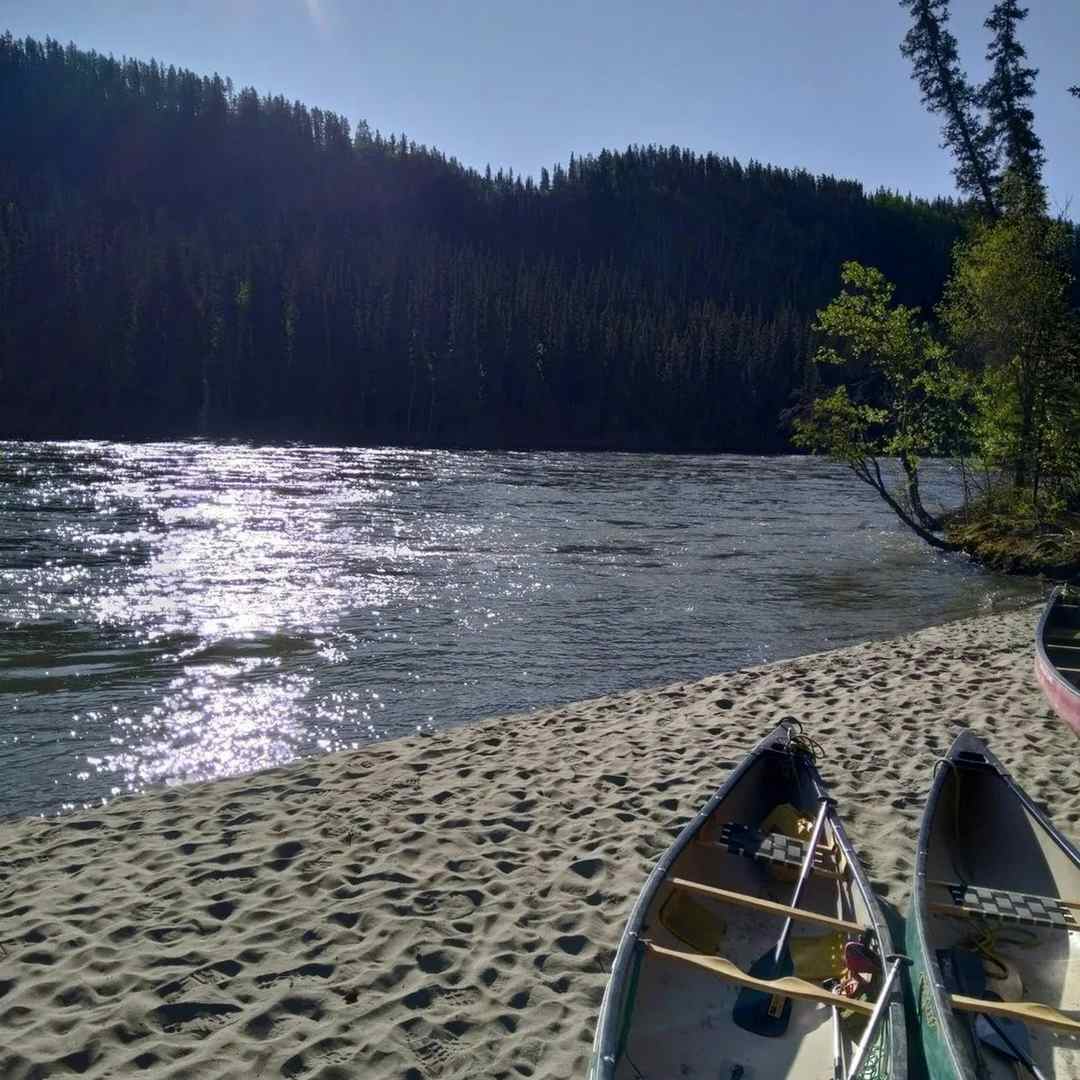
Fantastic trip. Got to experience the true Canadian wilderness.
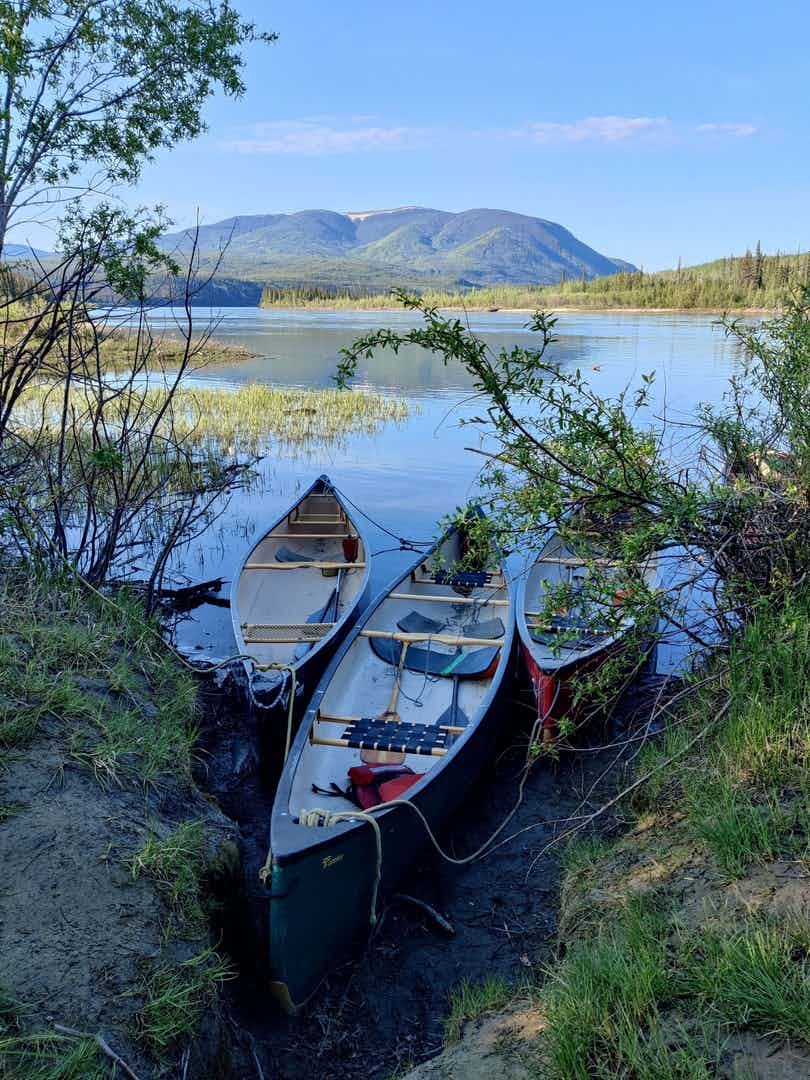
A great adventure in some beautiful places, roughing it in the wild. The paddling is a good challenge and there is a sense of adventure not knowing where you might be able to get to a campsite each day as conditions dictated their access. Mixed experience of our tour guides and some miscommunications with the tour operator hindered the experience somewhat.
Itinerary Activities
- Guided 9-day canoeing expedition on the Teslin and Yukon Rivers, from Johnson's Crossing to Carmacks
Guides
- Expert, local, English-speaking wilderness guides
Accommodation
- 2 nights in a hotel in Whitehorse
- 8 nights camping in the Yukon wilderness
Meals
- 8 nutritious breakfasts
- 9 picnic lunches
- 8 campfire dinners
Transfers
- Arrival transfers from Whitehorse Airport any time on Day 1
- Departure transfers to Whitehorse Airport any time on Day 11
- Transfers during the trip
Equipment
- All canoeing equipment
- All camping equipment
Our trips are hassle-free by design. We include all the activities and equipment, as well as many of the meals, so you can simply rock up with your rucksack and share the adventure with your new pals.
Travel to and from the trip
Our trips do not include flights, trains or other travel to the start point and back from the end point.
Tips
Tips are not included in the trip cost. These are entirely at your discretion but there is an expectation in North America to tip for good service.
Your host will help with advice, however we suggest a minimun of $10CAD/$7USD/£6 per person, per day as a guideline.
Of course, you are free to tip more or less, and the amount should be reflective of your perception of service and quality.
Personal Expenses
You know your own spending habits best, so please budget an appropriate amount for things like optional meals and drinks, shopping, optional activities, and laundry.
Travel insurance
Travel insurance is compulsory for all of our adventures and you are required to provide your policy information before departing. Your insurance should include adequate protection for overseas medical treatment, evacuation/repatriation, your baggage and equipment and the specific activities involved on your adventure. We also strongly recommend it includes cancellation and curtailment insurance, should you be unable to join your trip for specific reasons such as illness. Our recommended travel insurance provider is Campbell Irvine, as their insurance offers all of the above.
Visas
Visa requirements often change, and you are responsible for obtaining any required visas for this trip. Please check with your nearest embassy or consulate for up-to-date advice.
What's included?
- Twin-share Marmot or MSR, self-supporting dome expedition tents
- 115-litre dry bag for the expedition
- All group camping and cooking equipment
- Canoes, paddles and safety gear
What's not included?
- Sleeping bag and sleeping mat
What do I need to bring?
Please limit your total luggage to no more than 18kg / 40 pounds
BAGS
- Soft overnight duffel bag or rucksack
- Extra drybags for phone, camera and other valuables
CLOTHES
- Waterproof jacket
- Waterproof trousers
- Breathable wicking layers
- Fleece jacket or similar
- Thermals (merino is best)
- Warm hat
- Lightweight gloves
- Buff or neckscarf
- Lightweight trousers/shorts/skirts
- T-shirts
- Underwear and socks
- Swimwear
- Sunglasses
- Sunhat
- Something to sleep in
- Sandals/trainers/light walking shoes for around camp, something comfortable with a bit of protection
- Neoprene booties, mid-calf (not ankle height), 3mm or thicker, or rubber boots (minimum 10" high) for getting in/out of the canoe (some shorelines are rocky, some are more muddy, so a boot with good grip is important).
SLEEPING
- Cotton or silk sleeping bag liner
- Sleeping bag (2-3 season, with a comfortable rating of –5 degrees Celsius)
- Lightweight travel pillow (packable or inflatable)
- Thermarest-style lightweight sleeping mat
OTHER
- Universal travel plug adapter
- Power bank or solar charger
- Passports (and visas)
- Travel insurance documents
- Heavy-duty hand cream
- Ear plugs
- Insect repellent (best purchased locally, as it's more effective)
- Collapsable fishing rod and line/bait etc. if you want to try to catch some fish
- Suncream
- Small personal first-aid kit, inc. blister treatment (optional - guidess will also be well-equipped with a main first aid kit)
- Personal items (biodegradable toiletries, sanitary wear etc.)
- Hand sanitiser gel
- Quick-dry towel
- Headlamp or hand torch
- Reusable water bottle (x1 litre)
- Energy bars and snacks (optional, as plenty of food is included!) - read our article on Best Hiking Snacks
Pre trip accommodation in Whitehorse (single, twin or double) from
Payable Before Departure
Pre trip accommodation in Whitehorse (single, twin or double) from
… Per night
Optional Private Room & Tent Upgrade
Payable Before Departure
Optional Private Room & Tent Upgrade
… Per person
Private airport transfer - each way
Payable Before Departure
Private airport transfer - each way
…
We partner with the World Land Trust to ensure this trip achieves Net-Zero emissions. We also support their Buy an Acre programme, helping local communities to buy and protect natural habitats in perpetuity.
What's the number?
It works out on average at 135kg of CO2 emissions per person, including all local transport, accommodation, food, activities, guides, staff and office operations.
The only thing it doesn’t include right now is flights and travel to the destination. We do make an overall estimate across all our customers separately, but as we don’t book flights, have customers from all corners of the world, and no way of reliably knowing their travel plans, we simply can’t include an individual number in the figure on display here. We’ve got a goal to fix that, so that when you book, there is a way to measure and mitigate the carbon emitted by your flight too.
But what does the number mean?
Yep, hard to picture eh? To give you an idea:
- Driving 1000 miles/1609km would be approximately 281kg of CO2 in an average car (or 140.5kg per person, if there were two of you in it).
- A return economy class flight between London and New York would be approximately 1619kg (1.66 tonnes) per person.
- 10 trees in a temperate forest are estimated to remove approximately 250kg of CO2 from the air in a period of 5-10 years.
What are we doing about it?
Our trips are relatively low-carbon by design, and we're working with all our hosts to develop long term carbon reduction plans. We partner with the World Land Trust to ensure this trip achieves Net-Zero emissions. We also support their Buy an Acre programme, helping local communities to buy and protect natural habitats in perpetuity, ensuring the protection of the reserve and its wildlife.
Want to know more?
Amazingly, no international travel company has ever publicly published their carbon measurements before, as far as we know. We believe that must change, quickly. So we’re openly sharing the method we used in the hope that other companies will be able to more easily follow suit and build on what we've done so far. You'll find it all here.
Great question! A standard pair of knee-high rubber boots - knowns as 'wellingtons', 'ditch boots', or 'irrigation boots' depending on where you are in the world - are recommended (minimum 10” high). Wear these with a felt insole and a combination of polypropylene and wool socks and your feet should stay comfortably warm. Carry a spare set of insoles and socks, and in the case you ‘overstep’ your boots, they can be used to replace the wet ones.
We also suggest you buy a snug fitting pair of neoprene booties available at canoe or scuba diving supply shops. Most have integral soles. If you get a pair without soles you can wear them inside any general trainer or sport shoe. The height should be mid-calf, not ankle height. Don’t be fooled by the ‘surfing shoes’ made of quick-drying material rather than neoprene. They do not provide the necessary warmth. Tip: if you use neoprene booties, drip a teaspoon of hot water in each one in the morning. Shake and test with your finger. Then put them on and luxuriate in the warmth!
‘Sport’ sandals have become popular in recent years, however remember that the water in Yukon is cold and the sand is abrasive, especially after a few days of wearing sandals. For the general downtime at camp, bring light walking shoes or trainers, something that's comfortable with a bit of protection.
Yes you can, with a licence. Popping a line into the Yukon to have a go at catching some Arctic Grayling, Northern Pike or even Trout to cook over the campfire is a fun addition to the expedition if you're that way inclined - this is a totally optional element each evening while enjoying downtime at camp. Fishing licenses can be purchased online or in person upon arrival with an authorised dealer in Whitehorse for a very reasonable $36.41 CAD/$26 USD/£22. You can find all the details on the Yukon website
The canoe has a strong connection to Canadian culture and is deeply embedded in the way of life for the Indigenous Peoples of Canada in the wilderness regions. The first newcomers to the Yukon; early explorers, gold prospectors, trappers, miners and traders would all have relied heavily on the canoe as the most versatile and reliable mode of transport. The type of canoe you'll be using is commonly known as a 'Canadian' - a descendant of the original birch bark canoes used by indigenous peoples of North America. The Canadian is a lightweight, mostly open-top canoe with plenty of space for baggage as well as two passengers (you'll be in twin canoes). Your personal gear is kept in large drybags supplied by your host which are then secured to the inside of the canoe. Paddles used are traditional style with a mix of wood and laminate.
Your guides will filter water from the river and nearby springs - you don't need to bring any water treatment with you. Please just bring along a water bottle or bladder to carry your own water on the canoe and at camp. If you do want to bring your own water filter, this is fine and we suggest you read our guide on the best water filters for adventures
You are able to leave excess luggage at the hotel in Whitehorse to be collected when you return on Day 10.
This trip visits locations which can be considered to be remote, where the travel time to the nearest medical facility is likely to be above 12 hours, even with outside assistance. Outside communications in some locations may be limited. An evacuation may require a change of route from the originally planned one and the use of a support vehicle, either privately owned or public transport by land, air or water, to reach a point of medical care. Additional consideration should be given by and to those with pre-existing medical conditions with specific care needs and should be raised with your host before the trip. Those with pre-existing medical conditions should also seek guidance from a health professional prior to travelling. Should you experience health issues during your trip you should inform your guide immediately so the proper care can be provided. All travellers should have suitable and adequate travel insurance in place to provide cover for potential additional costs.
During this trip, you'll be camping in locations where there can be wildlife present in their natural habitat. Both smaller animals (i.e. birds and rodents) and larger ones (such as bears, deer, moose and elk) are primarily attracted to food, not humans. To protect the local wildlife, you need to ensure your food is kept out of their reach. When camping, the key is to be vigilant about not leaving any food or scented items (like toothpaste and other toiletries) in tents or exposed at the campsite. Your guides will typically designate a safe place to store these items overnight away from the tents, which campers can access if needed. Occasionally a larger animal may pass through or near to your campsite, especially in areas that overlap with their natural travel routes. In these cases, just like when encountering wildlife on the trail, it's important to maintain a safe distance, respect the animal's space, and calmly make your presence known if necessary. Your guides will provide more details and directives once at camp so everyone can follow best practices camping and do their bit to help keep wild animals wild.
This trip takes place in environments where wild animals are present in their natural environment, where protections and controls on their movement may be limited or non-existent. Some species may be dangerous, venomous, or unpredictable. Sightings are a privilege, but safety is key. Always follow your guide’s instructions and any posted signage.
We recommend considering your comfort around wildlife and discussing any concerns with your host before travel, particularly if you have allergies, phobias, or related health conditions.
Sure can! Over 70% of our travellers travel solo, it’s a great way to meet like-minded people.
Our team of Adventure Hunters co-create exclusive adventures which are run by highly vetted, specialist hosts. The trip is run by our trusted host partner in the destination. We only work with independent, local, in-destination experts who know the very best places to explore and how to stay safe. Read more information about the local teams we partner with. You’ll be introduced to the host straight after making a booking via the Much Better Adventures platform.
Much Better Adventures refer to the UK Government’s official travel advice when designing trips and monitoring trip operations. We recommend that all customers are familiar with the practical information provided on the Government’s FCDO website, where current travel advice can be found by searching for the applicable destination(s).
For customers joining this trip from other international destinations – please also read the official travel advice applicable to your country of residence/origin, as this may differ.
We recommend checking out the country-specific information and also talking to a travel nurse.
We automatically convert prices from the local currency that a host receives to your chosen currency. We update our exchange rates on a daily basis so this does mean that prices displayed on the site are subject to currency fluctuations, which is why you may see them change over time.
If you wish to change the currency you pay in, head to the bottom of the page.
All of our group adventures are specially designed for adults to enjoy as we want these adventures to bring together outdoorsy people who are truly like-minded. You must be over 18 to join one of our trips.
You're always in good company on one of our adventures.
Our trips are typically made up of a mixture of solo travellers and small groups of 2 or 3 friends, with most in their 30s-50s.
Our sociable adventures are solo-friendly by design and naturally attract outdoorsy people with a shared mindset; a love for adventure, a desire to push themselves and meet awesome, like-minded people along the way.
It’s this camaraderie that has so often turned a great adventure into a life-changing one.
Don't just take our word for it:
- 95% of people rate the group dynamics on our trips 5/5
- 90% of people recommend joining a trip to make new friends
- 75% of people have met people on our trips that they would now consider friends
See here for more info about the Much Better Adventures tribe.
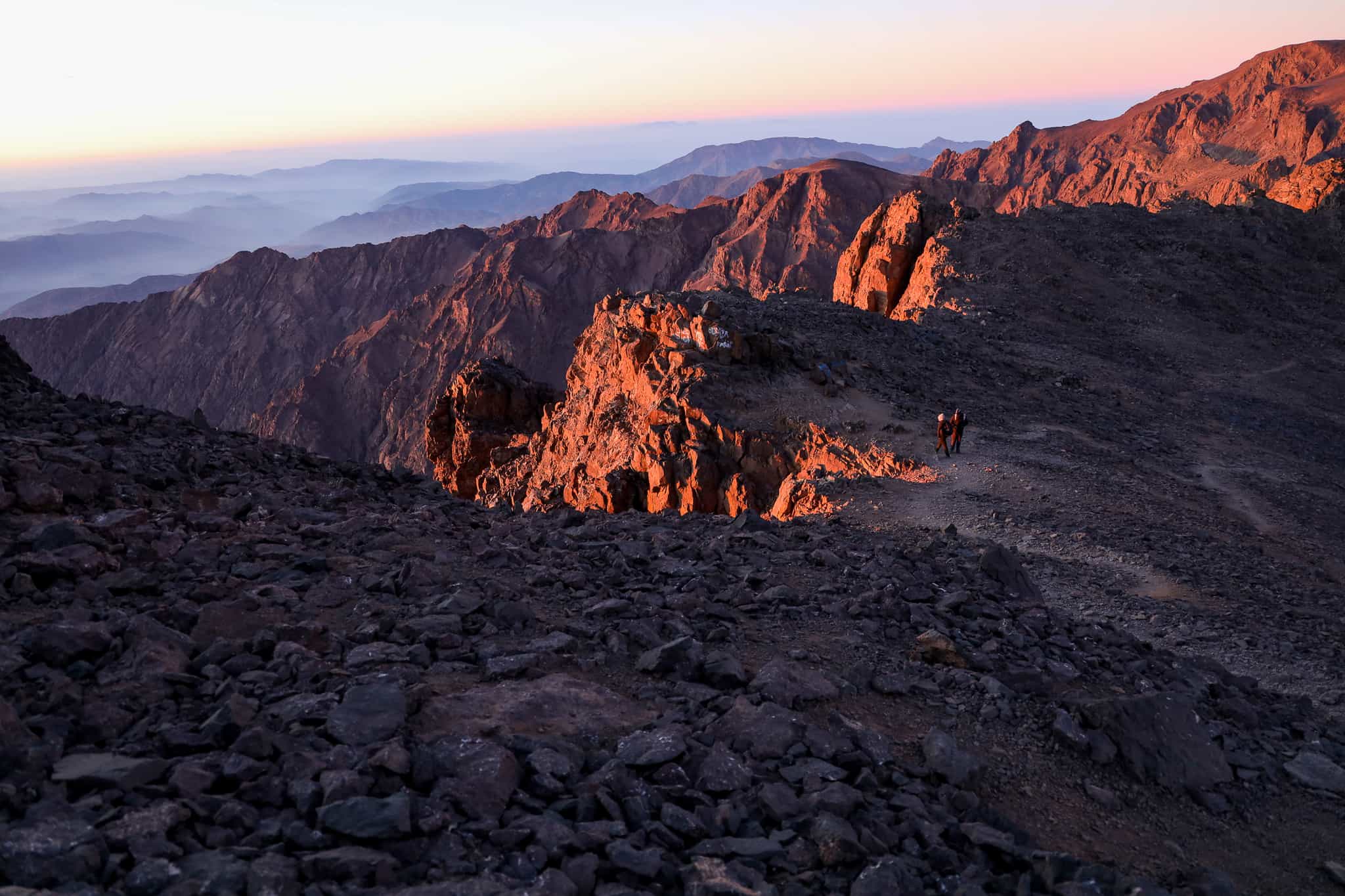
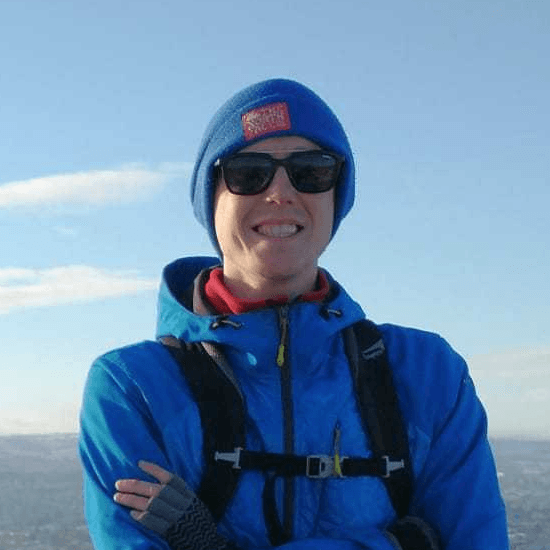
Need help finding flights?
From logistics and how to get there, to fitness, group dynamic and trip difficulty, Rory and his team of friendly experts are on hand to help.
We've got your back
Guaranteed to run
All Much Better Adventures trips are now guaranteed to run. Once you’ve booked your spot you can immediately make your travel arrangements, no uncertainty, no hanging about (excludes 'request to book' departures). Full details
Flexible payments
Secure your spot with the minimum deposit and pay off the remaining balance in as many instalments as you like, with no interest or fees. Full details
Happiness Guarantee
We’re so confident you’ll have an amazing time we’ll put our money on it. Full details
Full financial protection
To give you complete peace of mind Much Better Adventures is backed by ABTOT, ABTA and ATOL memberships. Full details
Tried & Trusted
Much Better Adventures is rated ‘Excellent’ on Trustpilot with over 1000 verified trip reviews averaging 4.8/5.
Connect before you go
You'll be invited to join a WhatsApp group to get to know each other before your big adventure together. Full details
DEPARTURE DATES
Sunday 27th July 2025
to Wednesday 6th August 2025
Fully Booked
